










TODAY, Monday, July 29, 2024, marks the commencement of the trial for nine individuals accused of electoral fraud, in a case that has captured national attention.
The defendants, including prominent political figures and former election officials, face charges related to alleged manipulations and irregularities during the 2020 general elections.
This morning, the prosecution team led by King’s Counsel, Darshan Ramdhani, is set to present evidence in the case that is expected to be closely watched.
The State has already handed over, to the defence, flash drives containing certified copies of Statements of Poll (SoPs) and Statements of Recount (SoRs), witness statements from 80 persons along with video interviews. Several bundles of documents were also disclosed.
Among those to take the witness stand are Minister of Local Government and Regional Development Sonia Parag; Head of the Diaspora Unit, Rosalinda Rasul; Forensic Investigator, Rawle Nedd and former Region Four (Demerara-Mahaica) Police Commander, Edgar Thomas.
Charged are People’s National Congress/Reform (PNC/R) activist, Carol Smith-Joseph; former Health Minister under the A Partnership for National Unity+Alliance for Change (AP-
NU+AFC) government, Volda Lawrence; former Chief Elections Officer (CEO) at the Guyana Elections Commission (GECOM), Keith Lowenfield; former Deputy CEO, Roxanne Myers; former District Four (Demerara-Mahaica) Returning Officer, Clairmont Mingo; and GECOM employees Sheffern February, Enrique Livan, Denise Babb-Cummings, and Michelle Miller.
They are accused of a number of offences, including misconduct in public office, uttering forged documents, and plotting to deceive the electors of Guyana by declaring a false account of votes.
It is alleged that the defendants inflated or facilitated the inflation of results for Region Four, the country’s largest voting district, to give the APNU+AFC coalition a majority win at the March 2020 elections, when, in fact, the People’s Progressive Party/Civic (PPP/C) had won by over 15,000 votes. All the defendants are on cash bail pending the hearing and determination of their matters.
The high-profile case, which was stagnant before the Georgetown Magistrates’ Courts for almost four years, can now proceed after a recent ruling by Chief Justice Roxane George, SC.
In the ruling, Chief Justice George dismissed an application by one of Lowenfield, Myers and Mingo’s attorneys, Nigel Hughes,
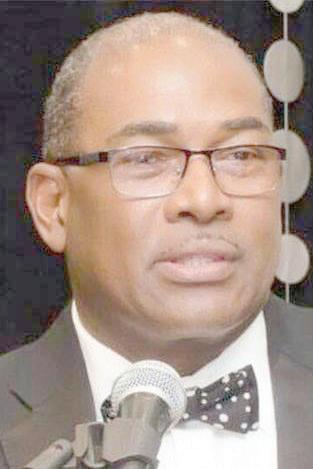
in which he contended that Section 140 (2) of the Representation of the People Act (RoPA) which prohibits disclosure of GECOM meetings, is unconstitutional because it infringes upon his client’s constitutional right to a fair trial.
Justice George ruled that the constitutional challenge was unfounded and that the trial should proceed. She, among other things, decided that RoPA, which forbids the revelation of GECOM communications, would not infringe upon the constitutional rights of the trio.
The trial was initially scheduled to begin on March 4, 2024 but that day, Hughes made a last-minute request for GECOM’s minutes for the election period, and proof of the Commission’s decisions. He had submitted that even though these records are essential to support the case of his clients—espe -
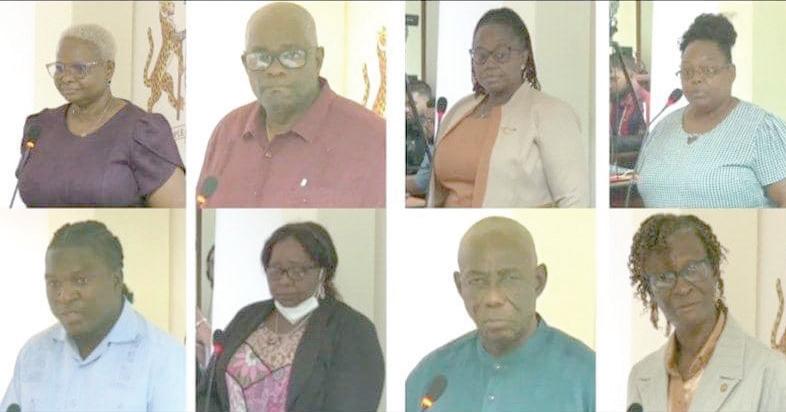


cially Lowenfield, Myers, and Mingo—GECOM is not allowed to disclose them according to Section 140 (2) of RoPA. Therein reads: “No evidence of any deliberations of the Elections Commission or communications between members of the Commission regarding its business shall be admissible in court.”
Hughes had argued that Mingo, Myers, and Lowenfield were “directed” to carry out specific decisions made by GECOM, such as “posting of results on spreadsheets.”
He had stated that
these records are required for cross-examination in the event he or other defence lawyers wish to refute the testimony of the GECOM commissioners and GECOM Chairperson, retired Justice Claudette Singh, who are also prosecution witnesses.
SENSITIVE ISSUES
Lead prosecutor King’s Counsel Darshan Ramdhani had responded to Hughes by emphasising that there is legislation preventing the disclosure of the

documentation and that the prosecution does not have the information Hughes is demanding.
He had reasoned that since elections are essential to a democratic society and the topics discussed by GECOM are sensitive, their release is prohibited by law.
He had said that Hughes only submitted a request for the records on February 28, 2024, despite the Chief Magistrate having ordered disclosure in the case more
See page 3

By Naomi Parris
MORE than $240 billion has been expended to make home-ownership more affordable in Guyana, and according to President Dr. Irfaan Ali, this has resulted in over 35,000 houselots being distributed and persons benefitting from crucial infrastructural development.
Dr. Ali, during a video broadcast on Sunday, said that the government has simultaneously been investing in the country’s infrastructure, enhancing road networks, and improving the availability of water and electricity.
“Housing does not come by itself. It comes with infrastructure to support housing schemes. To support these new housing schemes and these 35,000 houselots and homes that we’ve invested in, we have built 414 kilometers of new roads, 250 kilometers of new wa-
ter transmission mains and more than 2,200 kilometers of electricity transmission lines,” President Ali said.
The People’s Progressive Party/Civic (PPP/C) Government, he highlighted, has implemented measures to make home-ownership more affordable, including subsidies and lower interest rates.
Already over 3,000 houses have been delivered, with a focus on low- and moderate-income segments, and the government is expanding the housing programme to reach every part of the population
“An average low-income house lot is subsidised by almost $4.2 million and we brought down interest rates.... This has led to an increase of about eight to 10 per cent in new housing loans at a value of $56 billion,” he said adding:
“We built more than 3,000 homes, more than 1,000 low-income housing at a cost of more than $5.9 billion, more than 400 mod-
erate-income homes, 100 middle-income homes and more than 1000 young professional homes.”
In addition to this, the government has ensured support to the vulnerable by investing in core homes. He further highlighted that some $2 billion has been invested in hinterland housing, while more than 16,000 young people have benefitted from the mortgage relief programme.
“We don’t just promise, we deliver, and, on housing, we have delivered in less than four years.
We have made home-ownership more affordable, we have created infrastructure, built roads, built electricity networks, given access to water and expanded a housing programme to reach every segment of the Guyanese population,” President Ali said.
LAND TITLES
Meanwhile, some 56
–– gov’t making home-ownership more affordable, more than $200B invested in housing
–– more to be done to fast-track land regularisation, promote ownership, President Ali says

President Ali, on Sunday morning, distributed certificates of title to several Region Three residents, granting them legal ownership to lands they have occupied for years.
persons received certificates of title for houselots in Region Three (Essequibo Island- West Demerara), on Sunday.
From page 2
than two years ago.
In light of this, Ramdhani had asked the magistrate to reject Hughes’ last-minute request for the documents, characterising it as a frivolous attempt to further delay the start of the trial.
The King’s Counsel had called Hughes’ statement that his clients were directed to use spreadsheets “most startling” because, according to him, the Chief Justice had issued an order banning the use of spreadsheets for election results computation. He had pointed out that GECOM had not announced that spreadsheets will be used to tabulate votes.
After considering submissions from both sides, Magistrate Daly referred
the issue to the High Court for it to rule on the constitutionality of Section 140 (2) of RoPA. As such, the proceedings before her were placed on hold pending the Chief Justice’s ruling.
The APNU+AFC Coalition received 171,825 votes, while the PPP/C received 166,343 votes, according to former CEO Lowenfield’s election report. However, it was evident from the official findings of the recount process, which was supervised by GECOM and a high-level Caribbean Community (CARICOM) team that the coalition had received 217,920 votes, while the PPP/C had received 233,336 votes, which was enough to win.
In order to help the AP-
NU+AFC caretaker administration stay in power, Mingo and the other defendants, allegedly inflated the results in Region Four, the largest voting region in Guyana, as the recount process also revealed. In August 2021, GECOM made the decision to sack Lowenfield, Myers, and Mingo. Following the filing of charges against the defendants in late 2020, there have been multiple delays in the start of the trial, primarily due to requests from the defence.
Attorney General Anil Nandlall, SC had previously called the constant delays a “travesty,” pointing out that the charges are still pending and that a whole election cycle will shortly conclude.
The beneficiaries from the communities of Barnwell, De William and Philadelphia were granted their legal ownership of the lands they have been occupying for years.
The distribution fulfilled a commitment that was made by President Ali
during a recent outreach in the region.
“You will now be able to use this important asset to secure loans for home improvements, expand your businesses and build prosperity for your families,” the Head of State said.
The government, he related, is in the process of regularising more areas in the region, and in those areas where lands cannot be regularised, the govern-
ment will work to relocate residents.
“It’s not just about land titles, it’s about providing infrastructure, building roads, expanding roadways, and ensuring access to water, electricity and drainage.
We are committed to offering a complete package for a better and more prosperous life,” President Ali said before personally handing out certificates to residents.

PROGRESS fighting global hunger has been set back 15 years, leaving around 733 million people going hungry in 2023, equivalent to one in 11 people globally, and one in five in Africa, according to the latest UN State of Food Security and Nutrition in the World (SOFI) report published on Wednesday.
“The bottom line is that we are still far off-track towards the goal of ridding the world of hunger, food insecurity and malnutrition by 2030,” said Maximo Torero, Chief Economist at the UN Food and Agriculture Organisation (FAO), in reference to the Sustainable Development Goals (SDGs), and specifically SDG 2: Zero Hunger.
Mr. Torero noted that if current trends persist, around 582 million people will still face hunger in 2030, half of them in Africa.
Despite progress in combatting stunting, and promoting breastfeeding, global hunger levels have remained stubbornly static for three consecutive years.
Between 713 million and 757 million people were undernourished in 2023, around 152 million more than in 2019, according to the report, a joint publication by FAO, the International Fund for Agricultural Development (IFAD), the UN Children’s Fund (UNICEF), the UN World Food Programme (WFP), and the UN World Health Organisation (WHO). (UN News)

–– outgoing CARICOM Chair says, highlights Region’s resilience –– calls for more collaboration among regional private sector, governments –– new Chairman says R egion must shape its own narrative
By Naomi Parris
THE Caribbean faces numerous challenges including climate change, an energy crisis, and inequality, and while leaders have acknowledged these, a holistic approach embracing more collaboration is needed to navigate these crises.
This was according to Guyana’s President and the Caribbean Community (CARICOM’s) outgoing Chairman, Dr. Irfaan Ali, during his address at the 47th Regular Meeting of the Conference of Heads of Government of the Caribbean Community in St. George’s, Grenada, on Sunday.
The President highlighted that although global systems have failed the Region, the member states of the regional bloc have remained resilient in the face of adversity.
“We spent two years redirecting resources for education or infrastructure or agriculture or security to fight COVID, to give our people an opportunity to live. We did this with resources from our budgets. We did this with very little international help; we did this with some strong friendships that those before us would have created for us that we must go back to,” President Ali said.
The Region continues to grapple with shocks brought on by wars, triggering global
trends and the increase in commodity prices.
“As I speak to you today, in the last six months alone, we are importing inflation at a record level because of shipping; the cost of shipping increasing by more than 1,000 per cent -- 800 per cent,” he said.
Dr Ali further related: “We did not cause that. We did not create a conflict around the world that is driving up the cost of shipping, but we are facing those challenges…the climate crisis did not originate from this Region, the energy crisis did not originate from this Region, the inequality crisis did not originate from this Region.”
Aside from this, the Region remains vulnerable to the threats of climate change and despite contributing less than 10 per cent of the global greenhouse gas emissions, the Caribbean and Latin America continue to bear the brunt of the accelerating climate crisis; that was evident in Hurricane Beryl- a record-breaking category four storm.
He said that the Region will now have to redirect budgetary funding that would have gone to health care or education to strengthen capacity , to rebuild following the destruction brought on by Hurricane Beryl.
“Where is [sic] the voices of the private sector and

all those who profess immense love for the Region, in helping the leadership of the Region to call upon the international community to support the redevelopment and to support the rebuilding of the economies that suffered even from this latest hurricane?”
Dr. Ali questioned, as he examined the support shown to the region during the recent crises.
Dr. Ali, however, noted that regional leaders are not shying away from the challenges that stand before them. In fact, he noted that the region has been one of the louder voices in championing causes for climate justice, peaceful resolution and finding solutions.
“We have to now fight to ensure we build systems that work for us are not systems that are imposed upon us. We have to build systems that work for our Region,” Dr Ali posited, noting, that this would require more collaboration among the private sector, government, the academic community and other stakeholders.
“We have to trust in ourselves. We have to have faith in each other and we have to have hope about the future. We can define ourselves or continue to allow ourselves to be defined,” the Guyanese leader said.
Meanwhile, Grenada’s Prime Minister and the in-
coming CARICOM chair Dickon Mitchell, reiterated the Caribbean’s resilience and solidarity in the face of natural disasters, highlighting the devastating aftermath of Hurricane Beryl.
“We must shape our narrative that says we have the same right as everyone else on this earth…we have been tested time and time again and yet we rise,” he said.
Beryl, an unprecedented category four storm, caused extensive destruction upon its arrival in the Caribbean nearly a fortnight ago.
Beryl set a record for the first-ever category four storm in June in the Atlantic, making landfall on Carriacou in Grenada, and wreaking havoc on nearby islands.
St. Vincent and the Grenadines, Jamaica, Barbados, and St. Lucia were among some of the Caribbean States that were affected during Beryl’s passage across the region.
Thousands of people across Grenada and St. Vincent and the Grenadines were left homeless by the storm. Schools, businesses and crops were all destroyed, and, in some islands, fatalities were recorded.
CARICOM states have been rallying together financial aid, manpower and all forms of support to assist the islands that have been affected.

COMMISSIONER of Police (ag), Mr. Clifton Hicken firmly believes that a highly educated Police Force is indispensable in cultivating trust, safeguarding public safety, and serving our communities with unparalleled excellence.
Commissioner Hicken acknowledged this during his remarks at last evening’s gala ‘black & white’ with Bow Tie Awards C erewmony at the Officers’ Mess Annexe, Eve Leary, which was part of the activities to celebrate the Guyana Police Force’s 185th anniversary.
“Congratulations to our awardees. We are immensely proud of your accomplishments, and excited to witness the positive impact you will undoubtedly make on policing,”
Commissioner Hicken told the immaculately decked-out gathering, comprising all Officers and Ranks of the Guyana Police Force who graduated with a degree or higher from a recognised university or learning institution.
President Dr. Mohamed Irfaan Ali, National Security Adviser Captain Gerry Gouveia, senior officials from Guyana’s security
apparatus, and GPF’s stakeholders, especially the University of Guyana and other academic institutions, were in attendance.
“We stand here today not just to celebrate academic achievement but to honour the unwavering dedication of the Police Officers before us,” Commissioner Hicken stated.
He alluded to a quote from Nelson Mandela, who once said: “Education is the most powerful weapon you can use to change the world.”
“Earning a degree, be it a bachelor’s, master’s, or doctorate, is a challenge for anyone. However, to do so while shouldering the immense responsibility of law enforcement is truly a remarkable achievement. These Police Officers have showcased their unwavering dedication, sacrifice, and relentless pursuit of knowledge amidst the demanding responsibilities of safeguarding our communities,” Commissioner Hicken posited.
He noted that each officer and rank recognised at the ceremony has demonstrated exceptional resilience and a thirst for knowledge that goes above and beyond their call of duty.
According to Mr. Hicken, this commitment to knowledge not only enhances their professional capabilities but also broadens their horizons in several crucial aspects. It equips them with the critical thinking skills needed to meticulously analyse and effectively resolve complex situations that may arise in the course of their duties, as well as foster a deeper understanding of diverse perspectives and cultures, thereby nurturing their cultural sensitivity, enabling them to forge stronger connections and trust within the communities they serve. Moreover, Mr. Hicken stated that their academic pursuits provide an intellectual foundation that strengthens their leadership abilities.
Armed with a wealth of knowledge and informed decision-making skills, these officers and ranks are better prepared to lead with wisdom and integrity, guiding their teams through challenges with clarity and foresight.
“To our awardees, your dedication is an inspiration to your fellow officers, and a testament to the calibre of individuals within our Force. You embody the future of law en-
forcement; one defined by professionalism, continuous learning, and an unyielding commitment to justice. Let this ceremony serve as a powerful message: ‘We are committed to supporting the growth of our officers, coherent with our Strategic Plan under the pillar of Developing our People’.
As William Butler Yeats famously said, ‘Education is not the filling of a pail, but the lighting of a fire.’
During last evening’s ‘black & white’ with Bow Tie Awards Cerewmony, 136 Officers and Ranks, from Constable to Top Cop, and vice- versa, were awarded for their academic achievement.
Those recognised and awarded would have obtained a degree, master’s or doctorate from a recognised and accredited university/ learning institution. There were also several special awards given out at the ceremony, including to President Irfaan Ali.
The Master of Ceremony was Traffic Officer, Senior Superintendent Mahendra Singh.
RESIDENTS of St Cuthbert’s Mission are the latest to benefit from the government’s Eye Testing and Spectacles Vouchers programme.
Minister of Health Dr Frank Anthony spearheaded the medical outreach on Sunday, which saw the ministry teaming up with eyecare specialists to conduct free screening and distribute vouchers.
Francis Simon told the Department of Public Information (DPI) that he is heartened by the government’s support and the turnout from his fellow villagers.
“I’m happy that a lot of older persons are here too, because we know as you age one of the challenges you can have is [sic] eye issues,” he stated.
Charlotte Oselmo, also expressed gratitude to the team that visited, noting that the exceptional work and commitment they have demonstrated have made it easier for her to take the eye examination.
She said her sight is something she has been struggling with for months and she is excited that the issue can now be fixed.
Another beneficiary, Mahase Ramnarace,
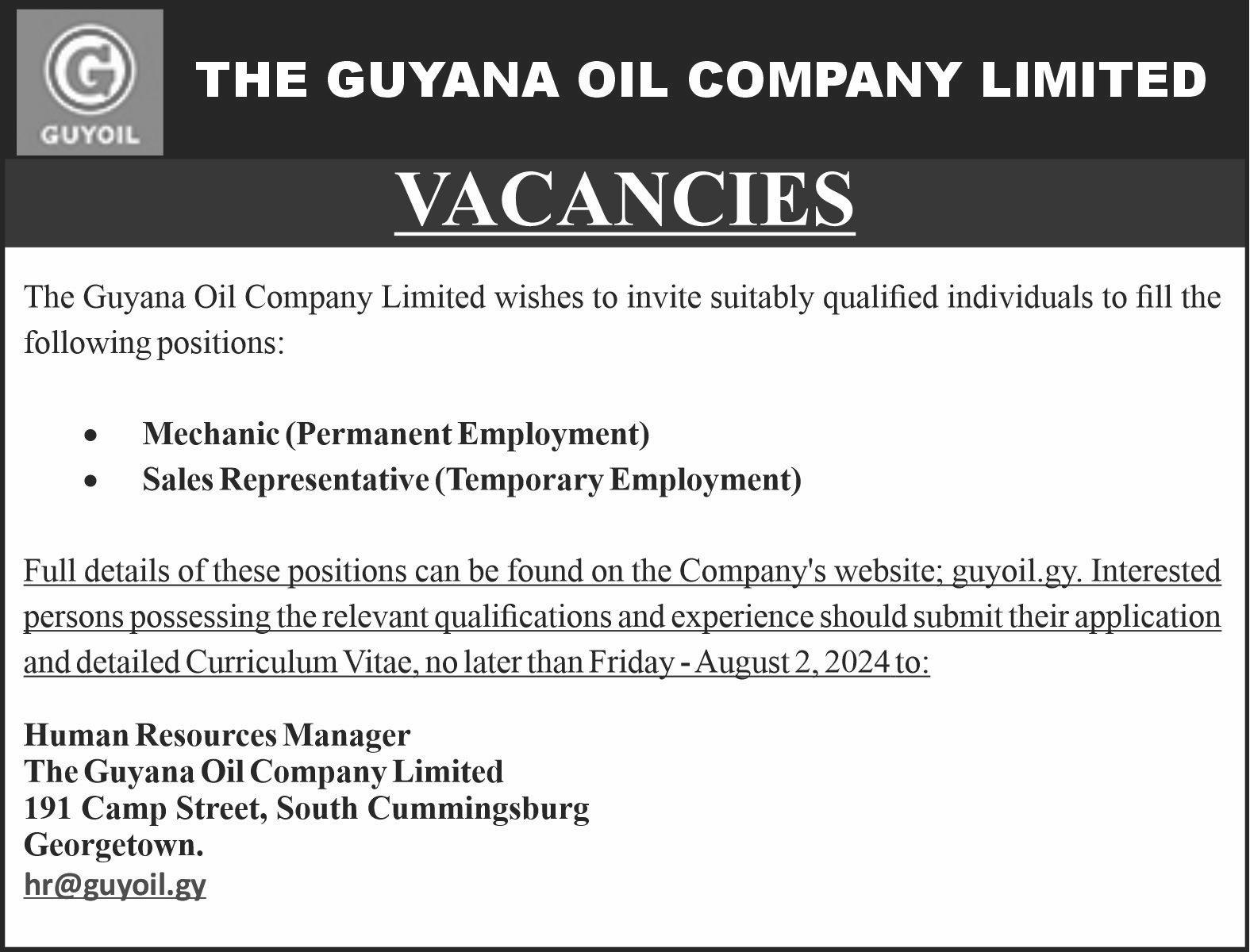
said, “I feel so happy this morning that this outreach came to our community. It is benefitting a lot of us in this village and I thank the government for assisting the people in St Cuthbert’s Mission.”
Meanwhile, Minister Anthony told the DPI that the programme has been progressing well, reaching thousands of persons through similar outreaches nationwide.
Doctor attached to the St Cuthbert’s Mission Health Centre, Terrence George, explained that the outreach will benefit more than 200 persons.
Similar outreaches will be done shortly whereby persons will be screened for cataracts and surgeries will be done for those in need.
Additionally, persons will be screened for hearing defects and hearing aids will be provided free of cost.
THE Eye Testing and Spectacles Vouchers programme provides vouchers worth $2000 for eye testing.
Once persons require spectacles, they can receive another voucher worth $15,000 to purchase a pair of spectacles. (DPI)

IN any democratic society, the relationship between the judiciary and the media is both pivotal and complex.
Recently, Justice Yonette Cummings-Edwards, Chancellor of the Judiciary (ag) of Guyana, illuminated this intricate bond during a significant press engagement at the Cara Lodge. Her remarks serve as a potent reminder of the indispensable role that the media plays in fostering a transparent and accountable judicial system.
Justice Cummings-Edwards aptly underscored the judiciary’s commitment to serving the public and its unwavering adherence to the rule of law. The judiciary is a cornerstone of democracy, tasked with upholding justice impartially and transparently. However, as the chancellor pointed out, the judicial system does not operate in a vacuum. It relies heavily on the media to bridge
the gap between legal proceedings and public understanding.
The media, in its myriad forms, is indeed an “inescapable” part of contemporary life; its power to shape public perception cannot be overstated. Justice Cummings-Edwards’ acknowledgment of this power is crucial.
By fostering improved access to information and ensuring reliable and responsible reporting, the media enhances public trust in the judiciary. In essence, the media’s role is not merely to report events but to facilitate a broader comprehension of legal processes and ensure that justice is not only done, but is seen to be done.
During her keynote address, the Chancellor rightly emphasised the necessity of balanced reporting. The media must present all facts objectively and truthfully, thereby contributing to a more informed and engaged public.
This responsibility is not without its challenges, but it is vital. The media’s ability to advocate for social change, hold institutions accountable and illuminate matters of public interest hinges on its commitment to these principles.
Moreover, Justice Cummings-Edwards highlighted the constitutional rights enshrined in Guyana’s legal framework, particularly the Freedom of Expression as outlined in Article 146. While this freedom is fundamental, it is not absolute. The right to free expression must be exercised responsibly, avoiding hate speech and statements that could incite division. The media must navigate this delicate balance, ensuring that its reporting does not undermine the very rights it aims to protect.
The Chancellor’s call for fair and constructive criticism is a reminder that the judiciary, while open to scrutiny, must also be evaluated with integrity.
Constructive criticism can foster improvement and accountability, but it should be grounded in fairness and an understanding of the complexities involved in judicial proceedings.
The symbiotic relationship between the media and the judiciary is essential for a robust, democratic framework. The media’s role in reporting on judicial matters is not just about covering cases; it is about upholding the values of transparency and accountability. As Justice Cummings-Edwards aptly noted, the judiciary is here to serve the public, and the media plays a crucial part in ensuring that this service is both visible and understood.
For this relationship to thrive, both institutions must engage in their roles with a commitment to responsibility, integrity, and respect for the principles that underpin our democratic society.
Dear Editor,
JUDICIAL overreach has now been paired with unbelievable arrogance from Judge Gino Persaud, who, in response to clear submissions that argue that the courts should cede authority on what can/should be done with PetroCaribe funds owed to the Venezuelan government by the Government of Guyana, declared, “I do not agree with the public policy argument as articulated and advanced by the Attorney-General”.
My view is that the judge may disagree with the public policy, but must respect it and its sanctity as beyond his power and reach. A judge cannot encroach onto the power of the Executive to make public-policy decisions.
Justice Persaud confined himself to following what courts decided in other countries, including Jamaica. The judge might want to note that Jamaica has no border with Venezuela, and is not threatened by a war of invasion and annexation with that country.
The law does not operate in a vacuum; the government is aware of the laws that would usually apply if a company has arbitration judgment against a government and is seeking to levy on assets around the globe, but what is different with this case is the border controversy that exists with Guyana and Venezuela, and the precarious position that any change in relations could provoke.
The International Court of Justice (ICJ) is hearing the case between the two
nations, and has accepted the Argyle Declaration into evidence (this agreement says neither country will take any action that would aggravate the other and increase tensions). Any child can see and understand that adherence to Justice Persaud’s judgment can be used by the Venezuelan government to claim Guyana has broken the agreement.
I am of the firm view that President Irfaan Ali must draw the line here. Guyanese lives and two-thirds of her territory are put at risk with this judgment delivered by Justice Persaud, and, when we add the ignorance and arrogance included within the language of the judge’s pronouncements, it has to be cast in a dustbin publicly, and along with that must come a Presidential admonition to the judiciary
to stay within their lane. It is a matter of life and death; Guyanese lives, Guyanese land, Guyana the country, the shape and size, the history, the culture are all threatened by a judgment that ignores realities on the ground.
I am in total agreement with calling this judgment “unpatriotic”, but would go further and call it “unthinking”; the product of a failed education system that relies on rote learning with not enough emphasis on ‘reasoning’.
It is imperative that President Ali draws the hard line before we suffer a great loss because of a decision made in a Georgetown courtroom.
Yours sincerely, Robin Singh
I HAVE been writing columns for 36 years now.
First, the Stabroek News, then the Catholic Standard, then the Guyana Chronicle, then the Kaieteur News. And I have returned to the Chronicle. In those years, I have done thousands of mental, historical, sociological, and philosophical reflections.
My repertoire includes political and psychological portraits of people in this country that I thought I should write on. The list includes the recently departed Ramon Gaskin. In the 90s, I was a columnist with the Stabroek News, and on November 11, 1993, I did a comparative analysis of Gaskin and Philomena Sahoye-Shury, AKA, Fireball, a top women leader in the PPP.
That was 31 years ago. My assessment of Gaskin at that time was negative, and it was positive for Shury. I will do a complete column on Gaskin shortly, and I will remind those who think they know Gaskin that I have known him since I was 18 years old and wrote about him 31 years ago. But for now, let’s look at GHK Lall. I think it is quite acceptable as a columnist to say he/she liked and disliked a person once temperate language is used. I never liked GHK Lall when he first came on the scene, because I sensed this was a publicity-seeker. Mr. Lall, an American resident or a citizen, for whatever reason returned to Guyana after spending most of his life in the US. And it is my thinking that he was looking to be somebody in Guyana.
So he started off by seeking space in
the media. He became a columnist with the Stabroek News, and he made himself a spectacle by using words that no one in Guyana knew what he was talking about. I remember a judge met me in the National Park and asked me why Kaieteur News has GHK Lall writing editorials, because no one understands what he writes.
Shortly after becoming a Stabroek News writer, Lall’s publicity lust drove him in my direction. He sensed that if he attacks me, he would get into the limelight. And he did. He wrote that he knows the three businessmen that built my home for me. The Stabroek News penned an editorial note demanding I come clean.
My wife never ever reacts to political things, but on this occasion she was annoyed. We exhausted every cent we saved, and this political non-entity could publicly announce that businessmen built my home for me. I was never full of gold the way GHK Lall was when he became chairman of the Gold Board, and I was never given the opportunity to have any amount of gold much less the amount Lall presided over.
I sensed Lall’s obsession with the PPP was because it closed down his gold mine when it came back to power in 2020. The nature of my work compels me to read everything that is written in the realm of political economy, sociology and international relations. But I do not read GHK Lall. I find him a completely unacceptable person that is shallow, and an intellectual non-entity (no apologies whatsoever).
Time after time, I would get emails from people urging me to reply to what
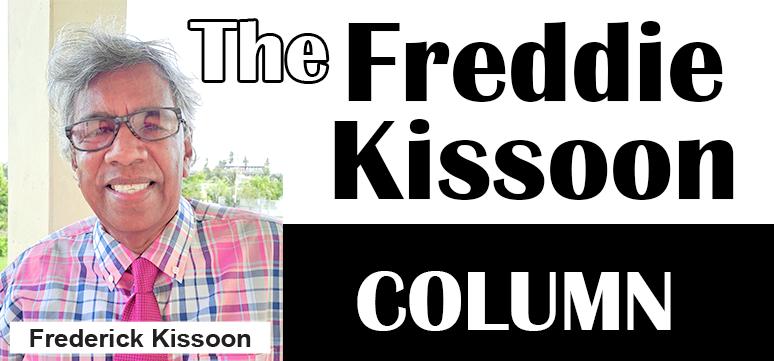
Lall has written, because they say people need to hear from me. I haven’t got even an infinitesimal urge to read Lall, because I am revolted at what the man is. But I read Dr. Randy Persaud, Adviser to the President.
And I read where Randy describes Lall as being xenophobic after Lall furiously hurled crass and demeaning insults at foreign workers in Guyana. When I read what Randy wrote, my revulsion got deeper. This is a man who has spent most of his life in another country, and returned to Guyana where he wrote that he collects senior citizen pension. Is he entitled to it? If he does, then so be it. But does he want it, considering his tenure as chairman of the Gold Board?
So I got this email from a minister of government informing me that GHK Lall is cussing down Vice-President Jagdeo because it was said on an Online newscast
By Vanessa Cort
ONE of the most decorated gymnasts in the world, Simone Biles, leads the US gymnastics team at the Paris Olympics, as she sets out to show the world the gymnastic wizardry that earned her the title GOAT (Greatest of all time).
This is a ‘far cry’ from the last Olympics in Tokyo, when she was forced to drop out, citing mental health issues. Then, she was roundly criticised by many, who felt she let the team down, but supported by others who understood her need to step back from the sport.
She thanked those who supported her and remained steadfast in the face of criticism, arguing that she could not give of her best when her mental health was failing.
Her sub-standard performance during the Games was certainly indicative that all was not well with her, which she subsequently confirmed in a move that shocked fans and fellow sports personali-

ties alike.
She did not wait until the Games were concluded, but made the brave decision to pull out of the all-round competition, after suffering a case of the “twisties” where she lost track of her spatial orientation.
This mental block was brought on by the pressure of the competition and what was expected of her. She confessed to feeling like ‘the world was on her shoulders’. However, the movement
she began following the Tokyo Games - which had to be pushed forward from 2020 to 2021 as a result of the COVID-19 pandemic - has persisted and is now a prime topic of this year’s Paris Games.
After a two-year break, the 4-time Olympic gold medallist returned to her winning ways, taking an 8th national title at the US Gymnastics Championships in August last year. She also made history becoming the
first woman to do the Yurchenko double pike, which now bears her name - the Biles 11 and recently submitted a new skill on the uneven bars.
According to Time magazine, “If she performs this skill during her Olympic competition - through the qualification round, team event, all-around, or individual event, if she qualifies for them - then it would be named after her. It would also represent a “clean sweep” as she already has two moves named after her in the vault, two on the floor and one on the balance beam. Should she perform this new skill Time says it would “...further cement her already indelible legacy in gymnastics”.
This astonishing list of achievements testifies to the athlete’s restored mental equilibrium, as she told CNBC, “I worked on myself a lot, I still do therapy weekly and it’s been so exciting to come out here and have the confidence I had before”. She made these comments following
that Lall was in receipt of money. So I went and read the item. I couldn’t understand what Lall was fuming about. His side-kick, Glen Lall announced that Bharrat Jagdeo is giving me millions to support the PPP. But that wasn’t the part of GHK Lall’s column that upset me. He deceived Guyanese when he wrote that a person can criticise the American Government like he does, and yet get a visa. He does not need a visa; he has American residency. Finally, someone should ask GHK Lall, AKA “Goldman”, if he thinks Glen Lall has the moral authority to criticise the government.
DISCLAIMER: The views and opinions expressed in this column are solely those of the author and do not necessarily reflect the official policy or position of the Guyana National Newspapers Limited.

her first appearance at the Core Hydration Classic last August.
But, more than all her impressive records, this legendary gymnast has brought fresh awareness to the mental health issues which trouble sports personalities all over the world. Many gained the courage to publicly admit their own vulnerability and insecurity as a result of her outspoken stance on the need to address her mental health.
She has re-energised the movement begun by champion Olympic swimmer, Michael Phelps, to end the taboo against mental health, making, ‘It’s okay, not to be
okay’, the clarion call for mental health awareness.
And after all the spectacle, pomp and splendour of the Paris Olympics opening ceremony, last Saturday, it is imperative for all athletes to heed the words of Simone Biles as she advocates for counselling.
“It’s really important to use that support system and know that they’re there for you and not against you, because at the end of the day, us humans, we hate asking for help... We think we can do it on our own, but sometimes we just can’t. So use every outlet given to you”.


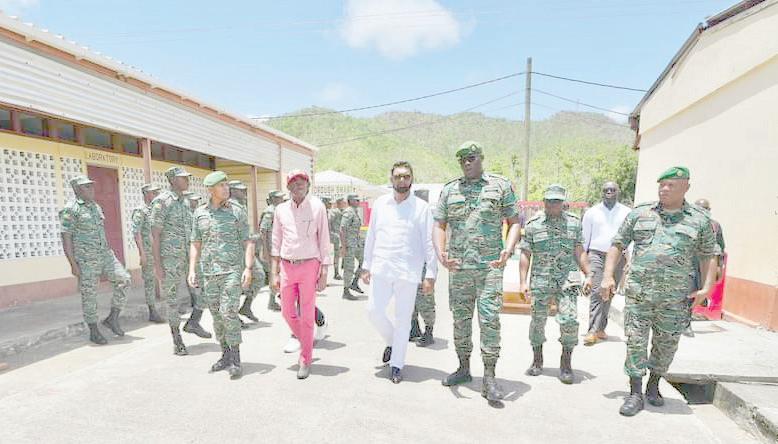




Dr Jagdeo highlights its impracticality, says billions invested by PPP/C
PEOPLE’S Progressive Party (PPP) General Secretary Dr Bharrat Jagdeo has dismantled Leader of the Alliance For Change (AFC), Nigel Hughes’ abstract theory on how the oil revenue should be distributed .
Despite Hughes’ party along with the A Partnership for National Unity (APNU) being in office from 20152020 and failing to deliver most of its manifesto pledges, the opposition has once again begun its campaign of rolling out promises.
However, Dr. Jagdeo used his weekly news conference on Thursday at Freedom House to highlight the impracticality of Hughes’ recent post on Facebook, which called for direct cash transfers to every citizen.
Firstly, the PPP General Secretary, who also serves as Guyana’s Vice President, said that oil revenue only funded 30 per cent of this year’s budget, which was $1.1 trillion.
As he continued to school Hughes, Dr Jagdeo highlighted that the budget for the health sector this year is $129 billion and the one for education is $135 billion.
As it relates to what is in the budget when it comes to the increase in wages and salaries from 2020, he said that it has now gone up by $90 billion.
According to Hughes, Guyana collects annual revenue of G$568.03 billion and the government should immediately table legislation which mandates that every adult citizen be given a direct cash transfer.
He then said that the payment shall not exceed 10.5

per cent of the annual transfer to the Natural Resource Fund (NRF).
However, with this, Guyanese would gain significantly less as opposed to what the government is spending on health, education and wages and salaries, among other things, according to Dr Jagdeo.
To give more perspective on the impracticality of this proposal, he explained: “So, if you take $300 billion today and you take, say, 10 per cent of it, which is $30 billion, and you divide [that] by 850,000 people, you will probably get about G$35,000 per year.
That’s what he wants…And next year, if we double, you’ll get $70,000 Guyana dollars. And he believes that that is the great proposal.
“So, what about the years that we don’t have any money? Or what [about] oil prices? There’s a prediction now
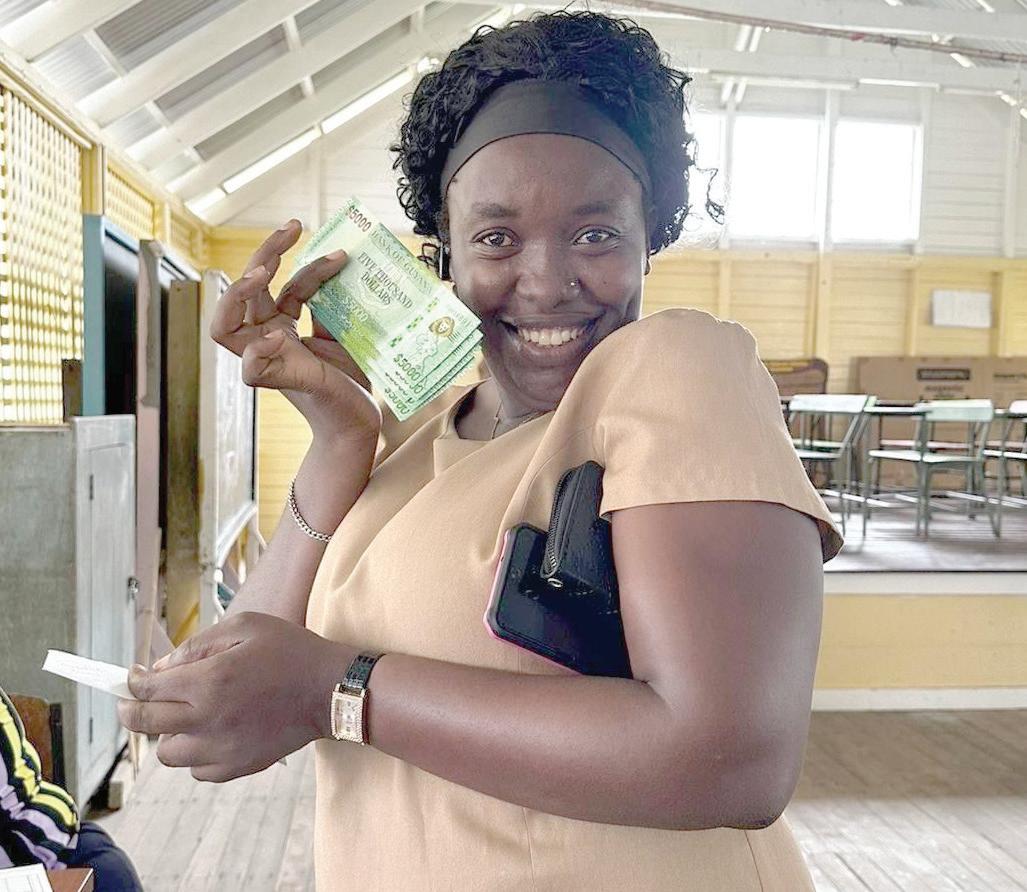
that oil prices could even fall because of oversupply. What if it comes down in the future? What are people going to be left with?” Dr Jagdeo questioned, while emphasising how unfeasible Hughes’ plan really is.
Also, the PPP General Secretary criticised the opposition for having a disorganised posture on the oil and gas sector and he said that the current government is now limited by the lopsided Stabroek Block contract that the former administration signed.
The AFC’s disorganised posture on the oil and gas sector was further cemented by the Vice President, who reminded the public that while the AFC Leader is advocating for immediate direct cash transfers, an article dated April 18, 2017, discloses that the AFC’s Raphael Trotman, the Natural Resources Minister at the time, rejected the idea of using oil revenue for cash payments.
Last week, the Government of Guyana withdrew a further US$ 1.5 million from the NRF following parliamentary approval.
According to a press release from the Ministry of Finance, those funds constitute the third transfer for 2024 to the Consolidated Fund.
The ministry noted that Pursuant to the NRF Act 2021, as amended by the Fiscal Enactments (Amendment) Act 2024, parliamentary approval was granted for US$1,586,150,331 (equivalent to G$329,885,563,088) to be withdrawn from the NRF in 2024.
The PNC/APNU/AFC has constantly made the call to increase spending, using oil revenues, on recurring expenditures -- that is wages/salaries, pensions, etc.
-- and this would increase the country’s recurrent expenditure without a sustainable financial strategy.
Also, the parliamentary opposition has not articulated a plan for what would happen if oil revenues fall or how these high recurrent expenditures would be financed in such a scenario.
This lack of foresight and planning is reminiscent of the economic mismanagement seen from 1964 to 1992 under the PNCR, which led Guyana to the brink of economic ruin.
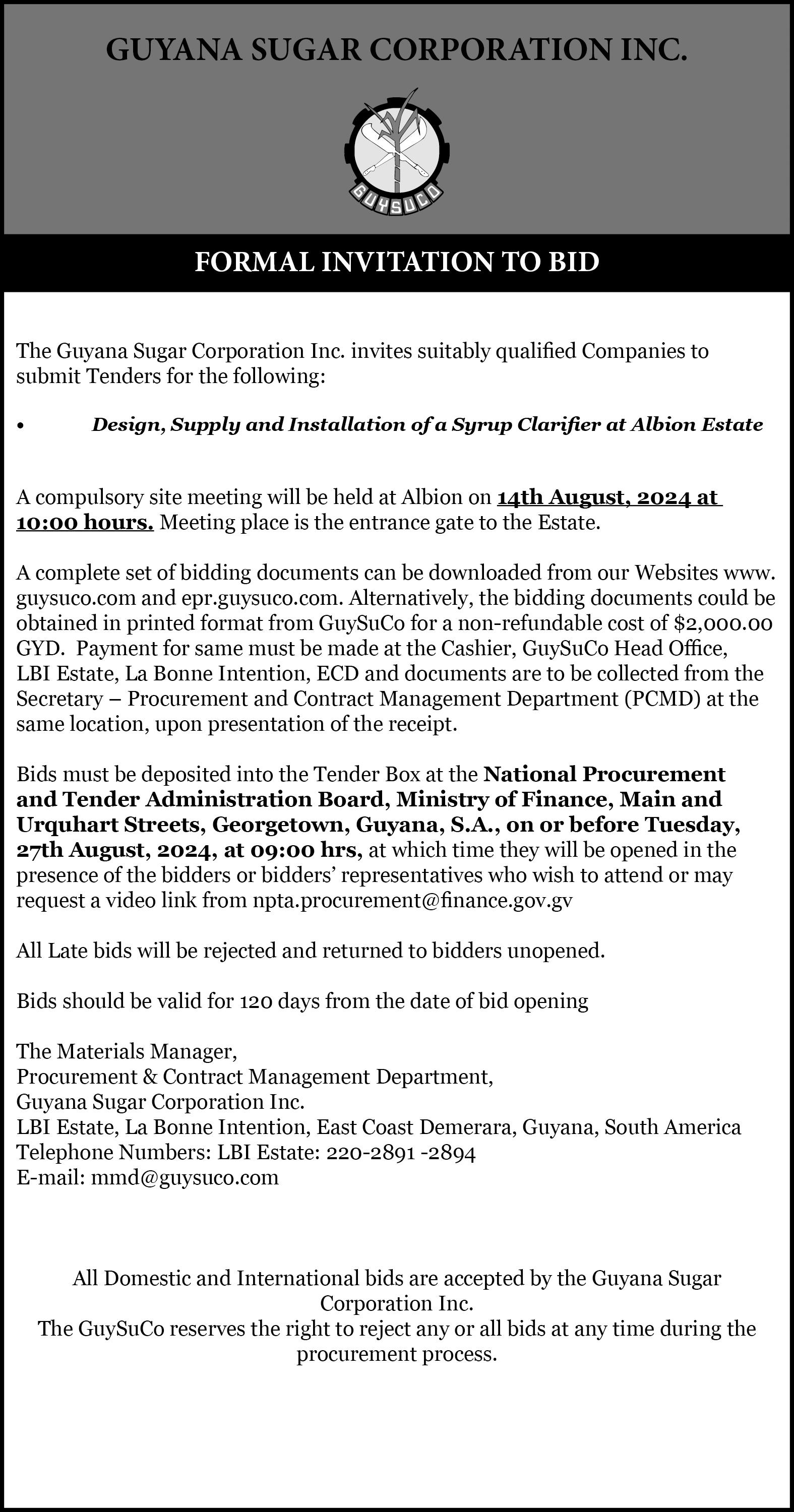
TWO Guyana Defence Force (GDF) ranks in uniform were intercepted and nabbed with 316 lbs of narcotics during another successful intelligence-led Police operation by Special Branch and other ranks.
Edward Mc Calmont, a 40-year-old Corporal of the Guyana Defence Force, attached to Camp Ayanganna and a resident of Kaneville, East Bank Demerara (EBD).
Another GDF rank, John Johnson, a 24-year-old Lance Corporal attached to Base Camp Stephenson and a resident of Timehri, EBD, was sitting in the front passenger seat.
GDF ranks, and found 49 large bulky parcels wrapped with transparent plastic on the bus seats.
Police opened the parcels in their presence and found that they contained a quantity of leaves, seeds, and stems suspected to be cannabis. The ranks were told of the offence committed, arrested and cautioned.
with the bus and the suspected cannabis which, when weighed, amounted to 316 pounds. The soldiers remain in custody as investigations continue.
The GDF ranks were escorted to the East La Penitence Police Station, along
Around 21:20 hrs on Saturday, acting on information received, ranks from Special Branch and other ranks went to Mandela Avenue, in the vicinity of Space Gym (behind the botanical garden), where they intercepted a Route 42 motor bus (#BTT 27), which was proceeding south along Mandela Avenue.
The bus is owned and was driven at the time by
They were both fully dressed in their uniform. Police informed them as to why they were stopped based on intel (information received) that they were trafficking narcotics. Police then carried out a search of the vehicle, in the presence of the two

This latest drug bust by the Police came in the wake of another similar bust last week, where two GDF ranks - Staff Sergeant Adisa Higgins and Sergeant Clovis Sam -- were nabbed with 154 lbs of narcotics (cannabis).


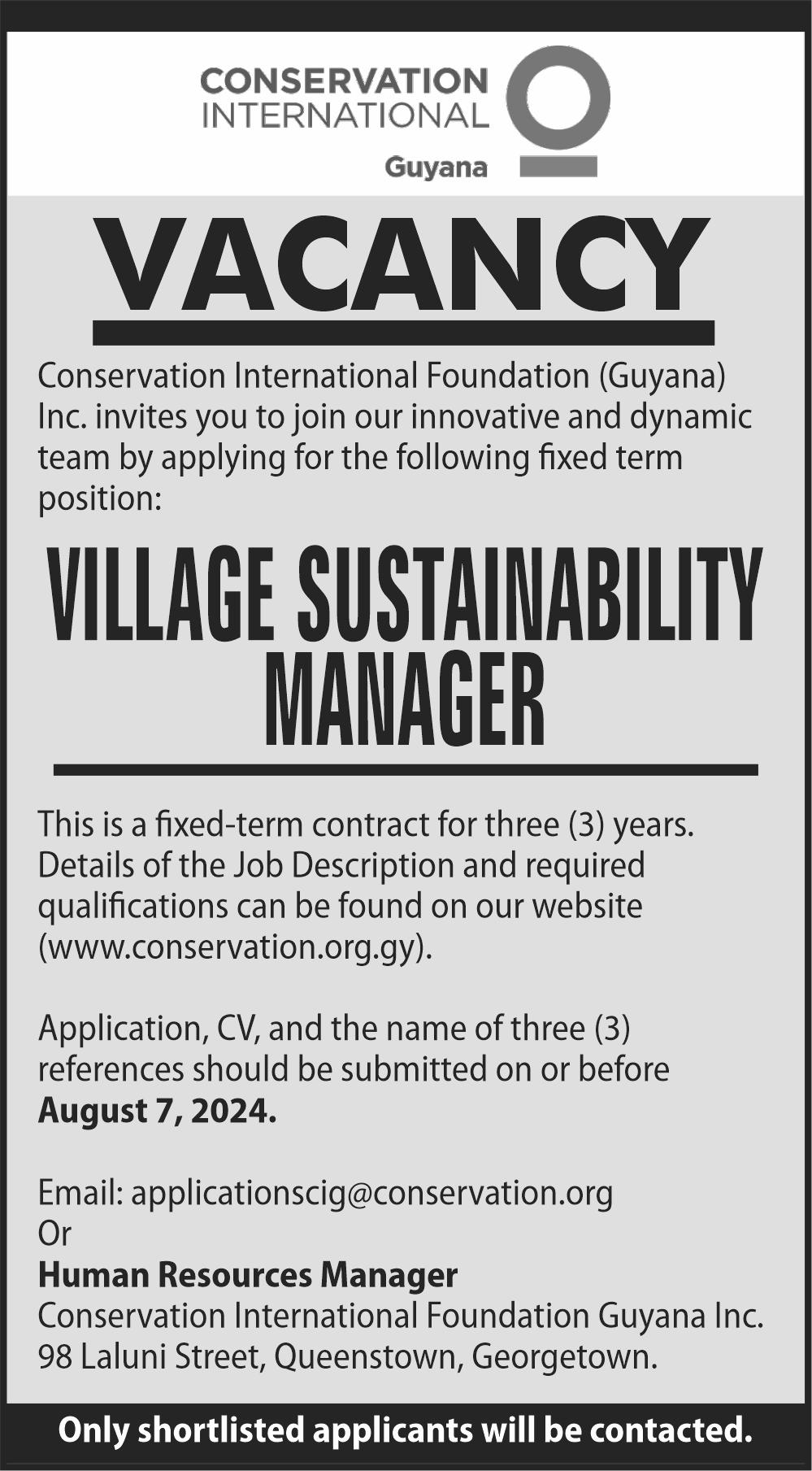
THE following is the full text of a statement from the Ministry of Natural Resources:
MINISTER of Natural Resources, Vickram Bharrat recently represented Guyana at the Amazonian Forever Summit in Brazil.
At the summit, hosted from July 26 to 27 in the city of Belem, Minister Bharrat shared Guyana’s innovative approach to climate finance.
He outlined Guyana’s model under its visionary Low Carbon Development Strategy (LCDS), which shows how economic development and environmental sustainability can be achieved harmoniously, specifically, through effective ecosystem valuation of forests.
During his address to the summit, which saw the attendance of ministers from Amazonian countries, Minister Bharrat presented Guyana’s progress on climate action, including maintaining a low deforestation rate.
He explained that Guyana’s model commenced with international public financing and has since evolved into a market-based mechanism with private financing.
Further, he informed the summit that Guyana had earned US$224 million under a bilateral agreement, based on verified results, with the Government of Norway. He went on to share that even
more recently, Guyana finalised a market-based agreement with Stabroek Block partner, Hess Corporation, for the sale of carbon credits worth over US$750 million. Already, more than US$230 million of the revenue from that sale has been received by the government.
The minister emphasised the need for a scaleable, replicable and sustainable model for climate finance utilising a low-carbon development approach and highlighted Guyana’s model in taking this forward.
With this year’s Conference of Parties (COP) meeting on the horizon, the minister also took the opportunity to outline the priorities of Guyana and those of the Amazon region.
He indicated that the region will use these opportunities to emphasise the importance of climate finance, the protection of forests and the ecosystems they support including watersheds and biodiversity.
Amazonia Forever, a holistic umbrella programme, was launched by the Inter-American Development Bank (IDB). It aims to scale up financing, share strategic knowledge for decision-makers, and enhance regional coordination to accelerate the sustainable, inclusive and resilient development of the

Amazon region.
The announcement was made in July 2023 after a meeting between the IDB’s governors for Bolivia, Brazil, Colombia, Ecuador, Guyana, Peru and Suriname. The governors, who are ministers of finance, econ-
omy, planning or other top officials, had signed a joint statement in support of the new programme. Amazonia Forever will address the following priority areas: local people; sustainable agriculture and forestry; the

bioeconomy; infrastructure; sustainable cities; and connectivity. It will focus on promoting the inclusion of women, indigenous peoples,
Afro-descendants and local communities; climate and forest conservation; and strengthening institutional capacities and the rule of law.






By Shamar Meusa
SIGNIFICANT achievements have been made over the last few months in various areas in the Caribbean Community (CARICOM) during President, Dr Irfaan Ali’s tenure as Chairman of the bloc.
This was highlighted by CARICOM Secretary-General, Dr. Carla Barnett, during the opening ceremony of the 47th Regular Meeting of the Conference of Heads of Government of the Caribbean Community at St George’s University, Grenada, on Sunday.
According to Dr. Barnett, since the last face-toface meeting of the heads which was held in Guyana in February, the community has been guided by decisiveness, determination and energy by the outgoing chair, President Ali.
“There have been notable achievements under his chairmanship, including increased engagement with Africa and the Middle East, advances on initiatives to increase the region’s food and nutrition security and arrangements to widen the membership of CARICOM,” Dr. Barnett said.
She added that there have also been other notable advances in other areas, including managing the crises in CARICOM member state, Haiti, where a transitional presidential council has been established through which a new cabinet was appointed.
As such, she said the critical role played by CARICOM Heads of Government and the Eminent Persons Group in bringing Haiti to the point of a tran-
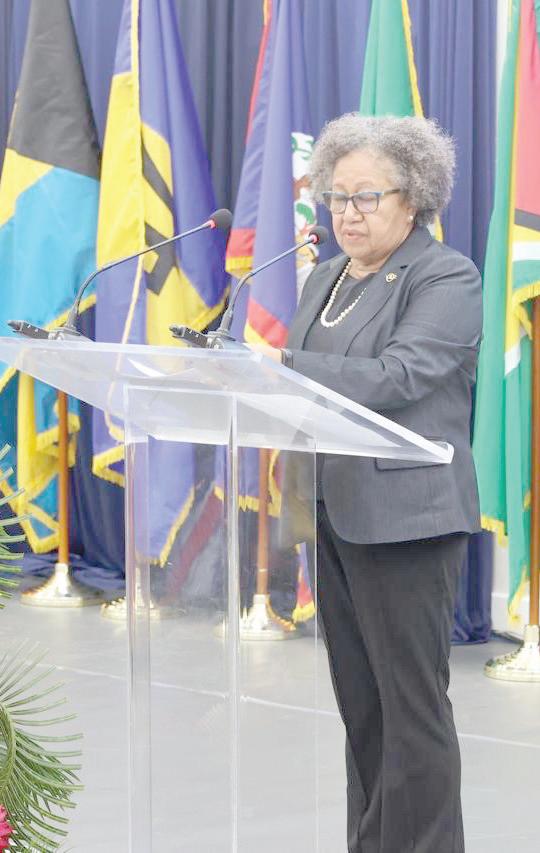
sitional government must be noted.
Meanwhile, the Secretary-General added that there are several critical discussions and decisions to be made at the 47th meeting of the heads.
She said: “The free movement of nationals in the community, the provision of a reliable and cost-effective regional transportation system, establishment of the CARICOM single market and economy, economic and political co-operation and common market instruments, as our countries reinforce resilience and growth, it is critical that this 47th regular meeting advances these and other discussions and decisions intrinsic to the objectives of CARICOM integration.”
With that, she went on
to add that the Caribbean’s integration movement has entered into the second half of its journey to a century, as CARICOM celebrated its 50th-anniversary last year.
“As we celebrated our 50th anniversary during last year, we took stock of our achievements and evaluated our faithfulness to the ideals of our integration movement, even as we acknowledge that there is still much more work to be done,” she expressed.
Further, Dr Barnett indicated that there is no denying that there are many noteworthy successes, as CARICOM has led and supported hemispheric and global measures that have influenced the thinking of major countries around the world.
EACH year, the State of Food Security and Nutrition in the World report provides an update on the global progress or setbacks in achieving the 2030 goal of Zero Hunger. The 2024 report indicates that between 713 and 757 million people experienced hunger in 2023.
It also reveals that 28.9% of the global population, or approximately 2.33 billion people, face moderate or severe food insecurity, a figure that has remained virtually unchanged over the past three years.
Despite some improvements since the peak of the COVID-19 period, significant regional disparities persist. Africa remains the hardest hit with 20.4 percent of the population affected by hunger, while Latin America, particularly South America, has shown the most improvement (6.2 percent of the population), according to the Food and Agriculture Organization of the United Nations’ Chief Economist, Máximo Torero.
In an interview with FAO Newsroom, Torero examined the reasons behind regional differences and elaborated on the rigorous methodologies used to gather and analyse the data presented in the report.
He also emphasised the importance of the new G20 alliance against hunger and poverty and discussed the current trajectory towards achieving food security for all, today and tomorrow.
WHAT FACTORS CONTRIBUTE TO AFRICA BEING THE REGION MOST SEVERELY AFFECTED BY HUNGER?
It’s crucial to examine the details of what’s happening. Comparing Africa with South America, a key difference we observe is that South America invests a significant amount of its resources in social protection programmes.
These well-developed programmes enable targeted interventions that effectively and quickly alleviate hunger due to their efficiency.
In Africa’s case, we have not observed the necessary capacity to deliver effective, targeted social protection programmes. Additionally, it’s a region disproportionately affected by conflicts, climate change, and economic slowdowns. It currently has the highest number of countries facing a food crisis due to these three key drivers, with conflict being the primary factor.
Furthermore, it’s a region currently facing significant financial challenges, particularly in terms of access to financing.
Many countries in the region are experiencing debt distress, limiting their resources and hindering the implementation of policies needed to accelerate hunger reduction efforts.
SO, IN LATIN AMERICA’S CASE, IS INVESTING IN SOCIAL PROTECTION PROGRAMS A LESSON THE REST OF THE WORLD SHOULD LEARN?
Absolutely, it is one of the lessons we need to learn from Latin America, particularly South America.
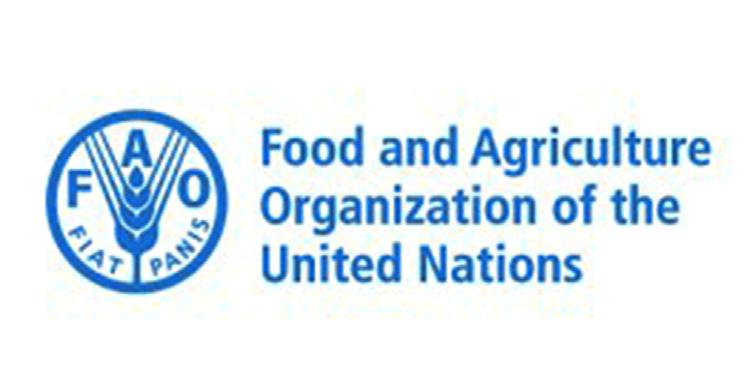
Brazil, Colombia, Peru and Chile have robust social protection systems in place. These systems allow them to react swiftly to changes and efficiently target their available financial resources, especially crucial given the current financial constraints everyone is facing.
By being effective in their approach, these countries can target the most vulnerable populations. Additionally, the region has been recovering quickly from the COVID-19 pandemic compared to other parts of the world. This recovery is a significant factor behind the positive changes we see there. We’re talking about over 5 million people being lifted out of hunger in the last three years.
This is a substantial improvement, bringing the region back to pre-COVID levels, which is precisely what we are striving for.
COULD CLIMATE CHANGE REVERT SOME OF THESE POSITIVE TRENDS IN THE REGION?
We have already surpassed six of the nine planetary boundaries.
What does this mean? It means that the frequency of extreme weather events will increase. And while Latin America has improved considerably, it still has much room for further progress. Although the region has strong institutions and social programmes like conditional cash transfers, it’s crucial that they continue to improve and not rest on their laurels.
Why? Because we need a conditional cash transfer plan where the targeting evolves according to where the shocks occur. It is not about simply giving money to the same people as before, but rather directing it to the most vulnerable, depending on the type of shock we are facing. FAO is working hard to find better ways to identify in advance where and what kind of shocks will affect the different countries.
There is much room for further improvement and also for gaining efficiency. We have learned a lot from past experiences, but the region must continue to learn. We are living in a world where vulnerabilities have increased. It is a world of risks, uncertainty, and climate change. Not only will it affect us with droughts, floods, and climate variability that make decision-making more difficult, but also with diseases and pests that will evolve.
We are seeing what is happening in the world today, but we must also consider the migration of species and the migration of humans. We need to work on that. Now, it is important to point out that within Latin America and the Caribbean, the region that is doing better is South America. Central America has a long way to go to achieve significant improvements, and the Caribbean also has a
lot to do to become more resilient, as they are the areas that will be most affected by climate change and are also the most dependent on food imports.
In short, the region is heterogeneous,
–– FAO Chief Economist says
and we must work to level it out and accelerate the necessary process to be prepared for a world that will change in terms of the frequency of events and climate shocks. (FAO)
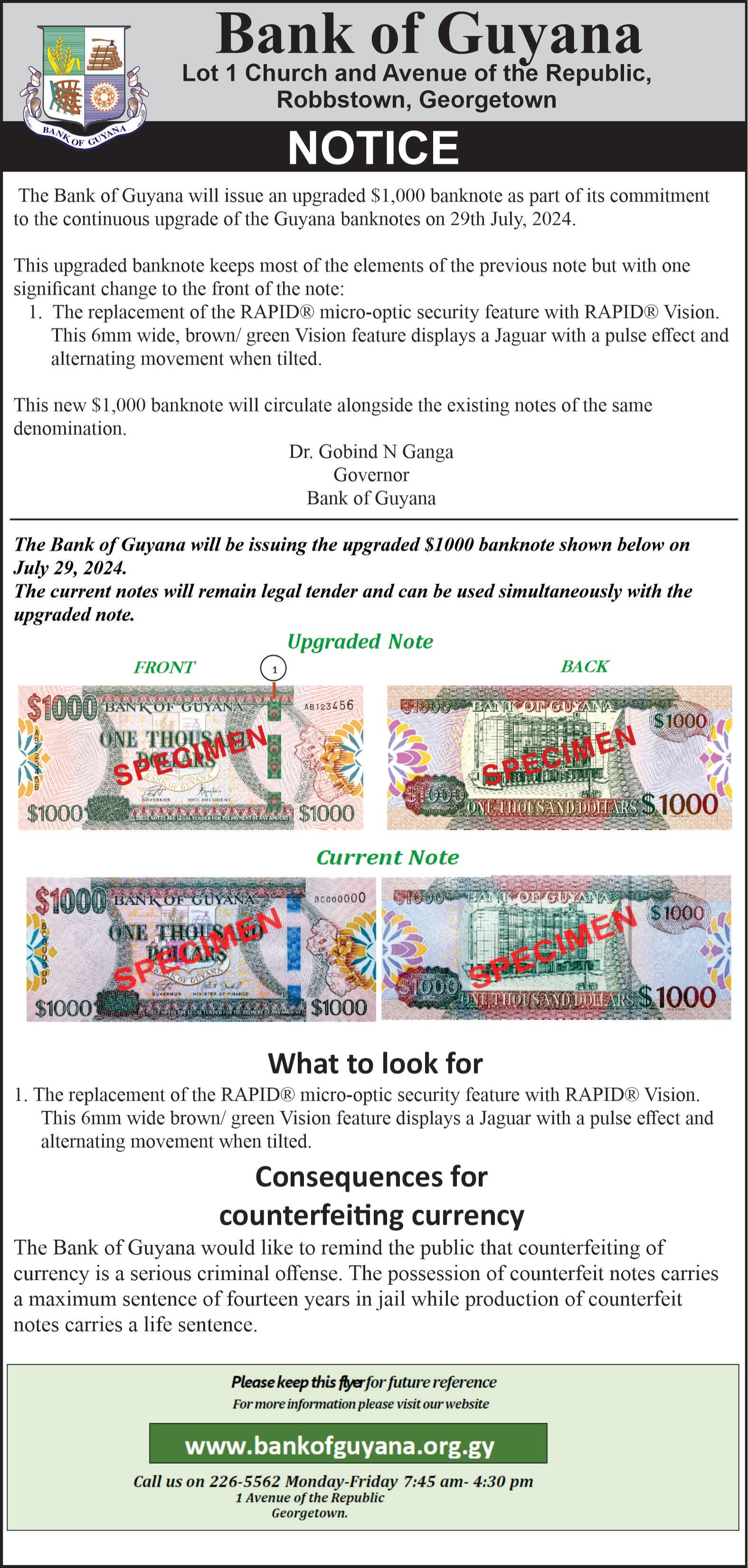
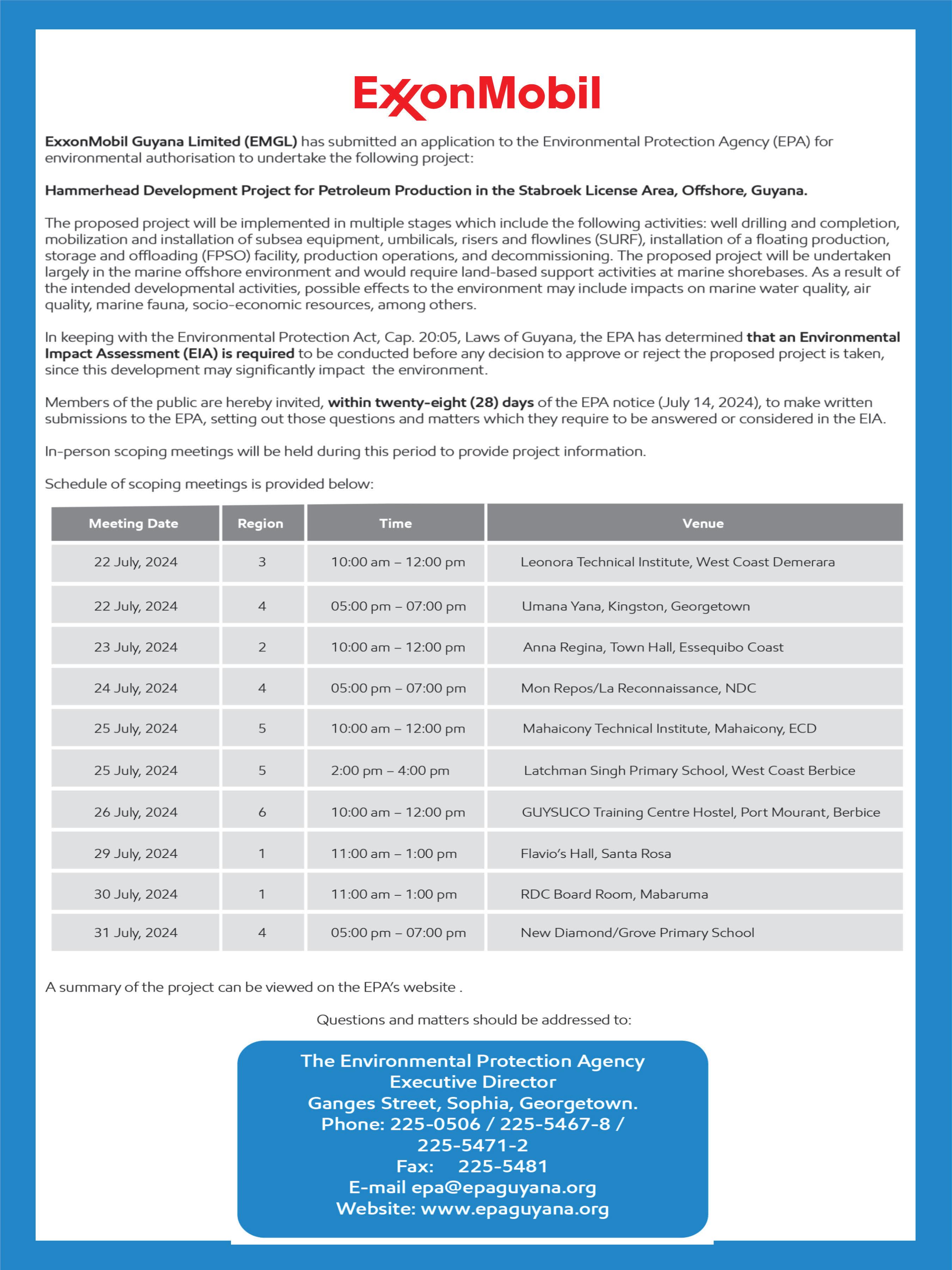
A 26-year-old resident of Goedverwagting squatting area, East Coast Demerara, Gordon Sancho, has died after he was shot around 00:30hrs at ‘C’ Field Cummings Lodge, on Sunday.
Enquiries disclosed that ranks from the Alberttown Police Station were on mobile patrol in a police vehicle when they responded to a report about the discharging of a loaded firearm with intent.
The report was made by a 15-year-old student and her 34-year-old mother, a security guard employed at a private security service.
The ranks proceeded to Section ‘C’ Field, Cummings Lodge, in the company of the persons who made the report, where Sancho was pointed out to them.
On seeing the ranks, Sancho reportedly took out a handgun from the waist of his pants and discharged two rounds in the ranks’ direction, forcing them to take cover.
One of the ranks discharged two rounds in the direction of Sancho, who ran a short distance in an eastern direction on the ‘C’ Field, Cummings Lodge road and then collapsed to the ground.
Police found a .380 pistol and three live rounds of .380 ammunition next to where he was lying.
Sancho was immediately picked up and taken to the Georgetown Public Hospital where he was seen and examined by a doctor on duty and later died while receiving medical treatment.
The body of the deceased is currently at the GPHC mortuary, awaiting a post-mortem. An investigation is in progress.

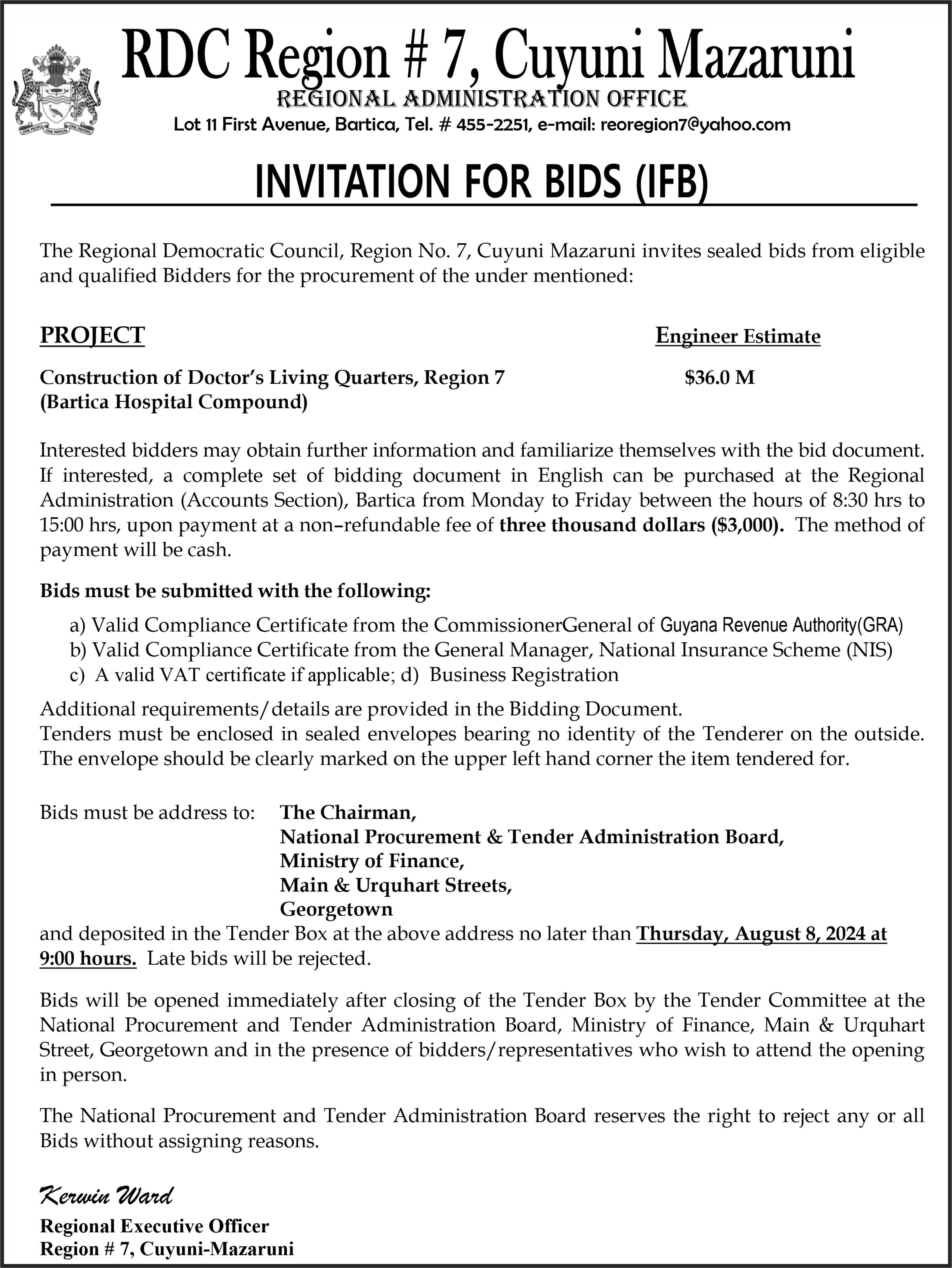

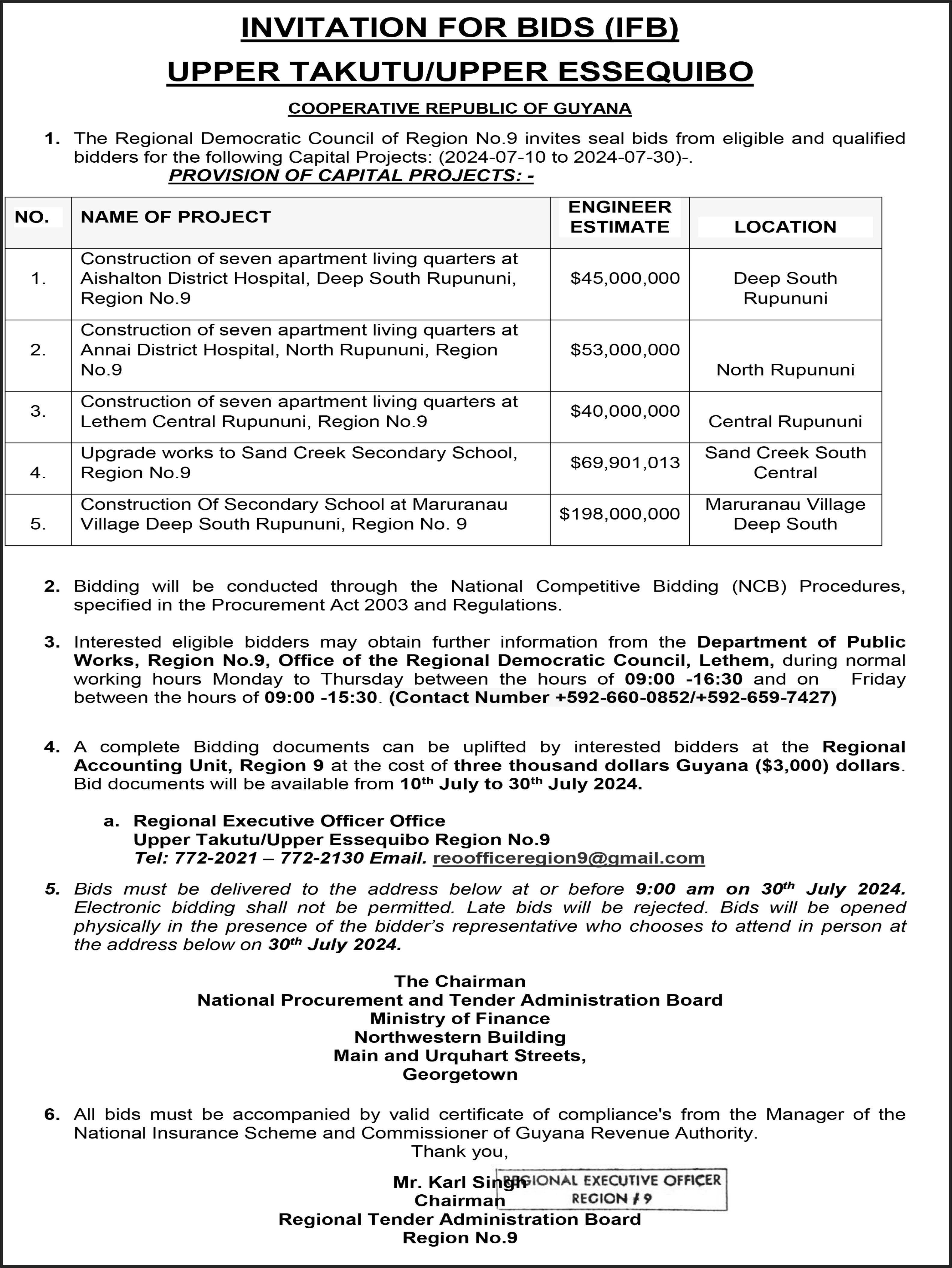

As we approach World Day Against Trafficking in Persons on July 30th, 2024, the Guyana Association of Women Judges (GAWJ) is committed to raising awareness about one of the most severe human rights violations in the world today. Trafficking in persons continues to be regarded as a global crisis, with alarming statistics that underscore its severity.
. The Global Slavery Index (2023) reports that approximately 50 million people currently live in conditions of modern slavery, the highest number ever recorded in human history1. These are not just numbers they represent real people, including men, women and children trapped in a web of exploitation and abuse.
Even after ten years of raising global awareness, the situation remains deeply troubling. Despite ongoing efforts to combat human trafficking, a significant barrier remains: the lack of awareness and knowledge among the general public. Many individuals, including potential victims, are unaware of what constitutes human trafficking, the various forms it can take, the signs to look out for, and their right to seek protection under the law.
The clandestine nature of this crime, often hidden in plain sight, complicates the issue further. Traffickers exploit this lack of visibility, blending into everyday settings and making it difficult for even trained observers to identify and assist survivors. This pervasive lack of understanding hampers efforts to effectively combat human trafficking, ultimately allowing traffickers to continue their operations with relative impunity.
The Guyana Association of Women Judges (GAWJ) takes this opportunity to educate the public on what trafficking is and its various forms. By raising awareness, we aim to improve the identification of potential victims and empower individuals to take action. Together, we can create a safer environment and end this grave human rights violation.
In Guyana, the Combating of Trafficking in Persons Act No. 2 of 2005 defines trafficking as the recruitment, transportation, transfer, harboring, or receipt of a person through force, coercion, abduction, fraud, deception, abuse of power, or payments to exploit the person.2
The Combating of Trafficking in Persons Act outlines various forms of exploitation:
i. Slavery: Keeping individuals in conditions where they are treated as property and deprived of personal freedoms.
ii. Practices Similar to Slavery: Subjecting individuals to conditions akin to slavery, such as forced marriage or debt bondage.
iii. Forced Labor: Coercing individuals to work against their will under threat of punishment.
iv. Servitude: Compelling individuals to provide services they cannot escape from due to threats, coercion, or deceit.
v. Sexual Servitude: Forcing individuals to engage in sexual activities.
vi. Exploitation of Prostitution: Forcing individuals into prostitution, including practices like pimping and pandering.
vii. Commercial Sexual Exploitation: Profiting from sexual activities, including maintaining brothels and producing pornography.
viii. Child Pornography: Exploiting children to create por1 Free, W., 2023. Global Slavery Index 2023, Walk Free. Australia. Retrieved from https://policycommons.net/artifacts/11765996/global-slavery-index-2023/12657393/ on 16 Jul 2024. CID: 20.500.12592/mkkwpds.
2 Section 2(k) of the Act
nographic material.
ix. Illicit Removal of Human Organs: Trafficking individuals to harvest and sell their organs without their consent.
These definitions highlight the severe and diverse nature of human trafficking, underscoring the need for robust legal protections and public awareness to combat this crime effectively.
Human trafficking is a crime often hidden in plain sight, making it challenging to eradicate globally. Despite variations in signs, there are common indicators to watch for. Victims frequently exhibit signs of physical and/or sexual abuse, physical restraint, confinement, or torture. They may appear fearful, anxious, depressed, submissive, tense, or paranoid, particularly when discussing law enforcement. Often, victims are not allowed to speak for themselves, with a third party insisting on being present or translating. They may have few or no personal possessions and exhibit numerous inconsistencies in their stories. Additionally, victims are typically not in control of their identification documents, such as IDs or passports, and may claim to be just visiting without being able to clarify where they are staying.
Signs of sex trafficking include wanting to stop participating in commercial sex but feeling scared or unable to leave, disclosing reluctance to engage in commercial sex due to pressure, living where they work or being transported by guards, having a “pimp” or “manager” in the commercial sex industry, and working in industries where there is pressure to perform sex acts for money. Recognizing these signs can help identify and support victims of human trafficking.
It is important to distinguish between human trafficking and the smuggling of migrants, as they are often confused. Both involve moving human beings for profit, but trafficking involves additional elements: improper recruitment methods like coercion or deception and an exploitative purpose. The primary revenue for traffickers comes from exploiting victims in forced labor or prostitution, whereas smugglers earn from the fee paid by migrants, with no ongoing relationship after reaching the destination. Smuggling is always transnational, while trafficking can occur within borders. Many victims of human trafficking begin their journey by consenting to be smuggled, only to be deceived and/or later coerced into exploitative situations, making it challenging to differentiate between the two crimes. Accurately identifying and responding to each case is essential, as victims of trafficking are entitled to protection and assistance not typically available to smuggled migrants4
Human trafficking can happen to anyone, regardless of age, gender identity, or background. However, studies and recent statistics have found that women and children are the predominant groups of victims trafficked across the globe. According to the United Nations Office on Drugs and Crime, 1 in 3 victims of human trafficking globally is a child.5 Sexual exploitation of women is the most prevalent category of human trafficking, followed by forced labor trafficking.6
3 Wyatt, T. R., & Sinutko, J. (2018). Hidden in Plain Sight: A Guide to Human Trafficking for Home Healthcare Clinicians. Home healthcare now, 36(5), 282-288.
4 Omelaniuk, I. (2005, July). Trafficking in human beings. In United Nations Expert Group Meeting on International Migration and Development, UN/POP/MIG/2005/15 (Vol. 8).
5 https://www.unodc.org/unodc/en/endht/index.html
6 Rambhatla, R., Jamgochian, M., Ricco, C., Shah, R., Ghani, H., Silence, C., ... & Kourosh, A. S. (2021). Identification of skin signs in human-trafficking survivors. International journal of women’s dermatology, 7(5), 677-682.
In Guyana, a significant majority of trafficking cases involve females (87%), predominantly of foreign nationality, with Venezuelan nationals being the most represented group. The U.S. Department of State’s 2023 Trafficking in Persons Report found that in 2023, 327 trafficking victims were identified in Guyana. Of these, 239 were women, one man, and seven girls were exploited in sex trafficking. Additionally, 24 women, 27 men, 12 girls, and 17 boys were exploited in labor trafficking7
Traffickers exploit various vulnerabilities to control and profit from their victims. Some key risk factors include recent migration or relocation, substance abuse, disabilities, poverty, limited education, lack of work opportunities, lack of family support and homelessness.8
Vulnerable groups of citizens are often lured by false promises of employment, education, or a better life, only to find themselves trapped in situations where their dignity, freedom, and basic human rights are stripped away. The principal lure of traffickers is work. According to the IOM global database, approximately 56% of victims were offered jobs, with the most common types being domestic work, dancing/entertainment, waitressing, selling, sex work, and au pair/childcare.
Survivors suffer immense trauma, enduring physical, emotional, and psychological scars that can last a lifetime. Recognizing that survivors are often times in dire need of shelter, food, legal assistance, social support, and psychological treatment, the Combating of Trafficking in Persons Act provides a range of protective measures to support their recovery and reintegration into society
If you are a survivor of human trafficking, or know someone who is, do not fear coming forward. Survivors in Guyana are provided with immunity from prosecution for crimes committed as a result of being trafficked and are entitled to restitution for the pain and suffering endured.
Your anonymity will be strictly protected during legal proceedings. You will have access to safe housing, psychological counseling, and medical assistance in a language you understand. Additionally, employment opportunities, educational programs, and vocational training are available to help you rebuild your life. Legal aid will be provided in a language you comprehend, and you may be eligible for work permits.
Temporary visas allow you and your dependent children to stay in Guyana during the criminal case against traffickers, with the possibility of obtaining permanent residency. Family reunification is also facilitated, enabling immediate family members to join you in Guyana. These measures ensure that you can rebuild your life with dignity and security.
Human trafficking thrives on exploitation and deception, robbing individuals of their dignity and freedom. We urge all citizens to learn the signs of trafficking, such as physical abuse, being undocumented, working long hours in harsh conditions, or isolation from family and friends. Share this knowledge, report suspicious activities to the TIP Hotline at 623-5030 or 227-4083, or contact the nearest police station. Support organizations that aid survivors. Together, we can end this crime and restore freedom and dignity to those affected. Stand up, speak out, and end human trafficking.

7 U.S. Department of State. (2023). Trafficking in persons report. Retrieved from https://www.state.gov/reports/2023-trafficking-in-persons-report/guyana/ 8 Pascual-Leone, A., Kim, J., & Morrison, O. P. (2017). Working with victims of human trafficking. Journal of Contemporary Psychotherapy, 47, 51-59.
Written by: Christel Lambert, Vice President of the Guyana Association of Women Judges





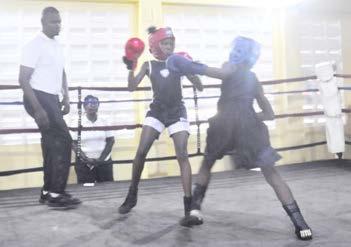

(Monday July 29, 2024)
CUMMINGS ELECTRICAL COMPANY LTD-83 Garnett Street, Georgetown (Tel: 225-6158)
Answers to yesterday’s quiz:
(1) Alzarri Joseph-3/98
(2) Chris Woakes-4/84
Today’s Quiz:
(1) Which WI had the best bowling figures in the second innings of the recent second Test vs ENG?
(2) Which ENG bowler had the best figures in the second innings of the recent second Test vs the WI?
Answers in tomorrow’s issue


CMC – West Indies were condemned to a 3-0 sweep against England in the Richards-Botham Trophy Series after tearaway fast bowler Mark Wood blew away the bottom half of their batting and set up the hosts for a 10-wicket win in the third and final Test on Sunday.
Opener Mikyle Louis hit the top score of 57 for the Caribbean side and Kavem Hodge supported with 55, but a devastating spell from Wood after lunch sent the visitors crashing to 175 all out in their second innings about an hour after the interval on the third day of the match at Edgbaston.
West Indies were 151 for five at lunch, but Wood produced a destructive spell to end with five for 40 from 14 overs to make him a shoo-in for the Play-
er-of-the-Match award and extinguish any possibilities of another fightback from the Caribbean side in the series, leaving England a modest 82 to win.
The visitors then suffered insult when Ben Stokes came to open the batting with fellow lefthander Ben Duckett because regular opener Zak Crawley had injured his hand earlier while trying to take a slip catch off Wood, and the England captain carved up their bowling to hasten his side to victory.
None of the West Indies bowlers were spared – and Stokes smashed pacer Shamar Joseph over mid-wicket for a six to set a record for the fastest 50 by an England batsman in Tests and the joint third-fastest overall off only 24 balls.
The result was for -
malised about 15 minutes before tea when a short, but flat faster delivery from West Indies captain Kraigg Brathwaite, peddling his uncomplicated off-spin, was plunked over the backward square leg boundary for six by Stokes, who finished on 57 not out, with Duckett, not out on 25.
West Indies also lost the first Test that ended three Fridays ago – inside three days – by an innings and 114 runs at Lord’s, and the second Test that finished last Sunday – inside four days – by 241 runs at Trent Bridge.
“For sure, looking back, I thought the 282 we got in the first innings wasn’t enough,” Brathwaite said during the post-play TV interview. “For sure, it was a better pitch than 282, but we fought back well, and
our discipline altogether wasn’t good.”
He added: “Generally, I do think that we were as disciplined as we could have been with the ball. For sure, when you look at the percentages and groupings of balls, they were not good enough. They were not good enough to put any batting team under pressure for long periods.”
Three wickets – one each to Stokes, off-spinner Shoaib Bashir and pacer Gus Atkinson – before lunch undermined West Indies and had them reeling after they resumed from their overnight total of 33 for two – still 61 behind.
Left-hander Alick Athanaze was lbw to Bashir in the first half hour of play after he added only five to his overnight score of seven, and the Caribbean side reached
the drinks break on 96 for three – a lead of only two.
Louis drove Stoke through mid-off for his fourth boundary to take the total past 100, and he smote Bashir over long-on for the first of his two sixes off the lanky off-spinner to reach his maiden Test 50 from 85 balls.
The 23-year-old Kittitian opener appeared to be getting into the swing of things when he nibbled at a delivery outside the off-stump from Stokes and was caught at second slip in the fifth over after the break.
Jason Holder came to the crease, never looked ruffled and ushered Kavem Hodge to his 50 from 56 balls before the lanky Barbadian all-rounder played lazily across a delivery from Atkinson and was lbw for 12 in the third-last over before
lunch – a dismissal confirmed after he unsuccessfully reviewed.
After lunch, there was little or no resistance from the rest of the West Indies batting, and Wood combined his searing pace, good control and reverse swing destroyed the lower order to take five wickets in a sensational six-over spell that cost only nine.
Seales was named the West Indies Player-ofthe-Series and Atkinson was named the England Player-of-the-Series.
The Caribbean side will return this coming week to the Caribbean, where they will start preparations for a twoTest series against South Africa, starting August 7 at Queen’s Park Oval in Trinidad with the second Test scheduled to begin on August 15 at the Guyana National Stadium.
CMC – WEST Indies’ captain Kraigg Brathwaite said he hoped his side’s chastening loss against hosts England in the Richards-Botham Trophy Series will spur them to better performances when they play South Africa next month.
The Caribbean side were condemned to a 3-0 sweep in the Richards-Botham Trophy Series after they lost the third and final Test against the English by 10 wickets on Sunday at Edgbaston.
They also lost the first Test that ended three Fridays ago – inside three days – by an innings and 114 runs at Lord’s, and the second Test that finished last Sunday – inside four days – by 241 runs at Trent Bridge.
West Indies will return this coming week to the Caribbean and will have little time to regroup and find a winning formula for a two-Test series against the South Africans – but Brathwaite said he believes that they can.
“I am very excited that we have [another] two Tests, starting in a week’s time against South Africa,” he said during a postplay interview on TV.
“We need more cricket, and I think being in this competitive and intense international game, and you are playing it more against good players, you will improve.
“Playing Tests six months apart, it’s kind of tough, so I’m excited for the series against South Africa, and we know where we have to
improve. Once we’ve got the right attitude, you will see growth and consistency.”
The first Test against the Proteas starts on August 7 at Queen’s Park Oval in Trinidad, and the second Test starts on August 15 at the Guyana National Stadium.
“I am looking forward to these two Tests because it is important to see growth,” he said. “I would have spoken about learning from the first Test and so on, and this is where it has to be shown. We have to see growth in this first Test against South Africa.
“It’s nothing hard. We have to get better at bowling at the top of ‘off-stump’, and we need to stay committed, as batters, a little longer – in both first and second in-
nings – but I am excited, and I’m looking forward to the two Tests coming up because once learning takes place, you will see growth in this team and Test wins.”
Brathwaite said a general lack of consistency all-round plagued West Indies throughout the series, but he said there
were a few positive signs that his side could take forward to use for future high intensity battles.
“We never gave up,” he said. “We always came back and fought – that’s one thing I must recognise.
“In the batting, Kavem Hodge got his first Test hundred, we [this group]
got one of our highest first innings totals.
“Bowling wise, we were good in pieces –Jayden had a very good series with the ball, Motie when he played got some crucial wickets, so we had some positives, and it’s important that we learn from this experience.”

CMC – Tidy spells from the trio of pacer Kyron King, and spinners
Nathan Sealy and Zishan Motara enabled
newly-minted two-day champions Barbados to stay on course for the double, with a nine-wicket win against
Guyana in the top-ofthe-table clash in the West Indies Men’s Under-19 Super50 Cup on Sunday in St. Vincent.
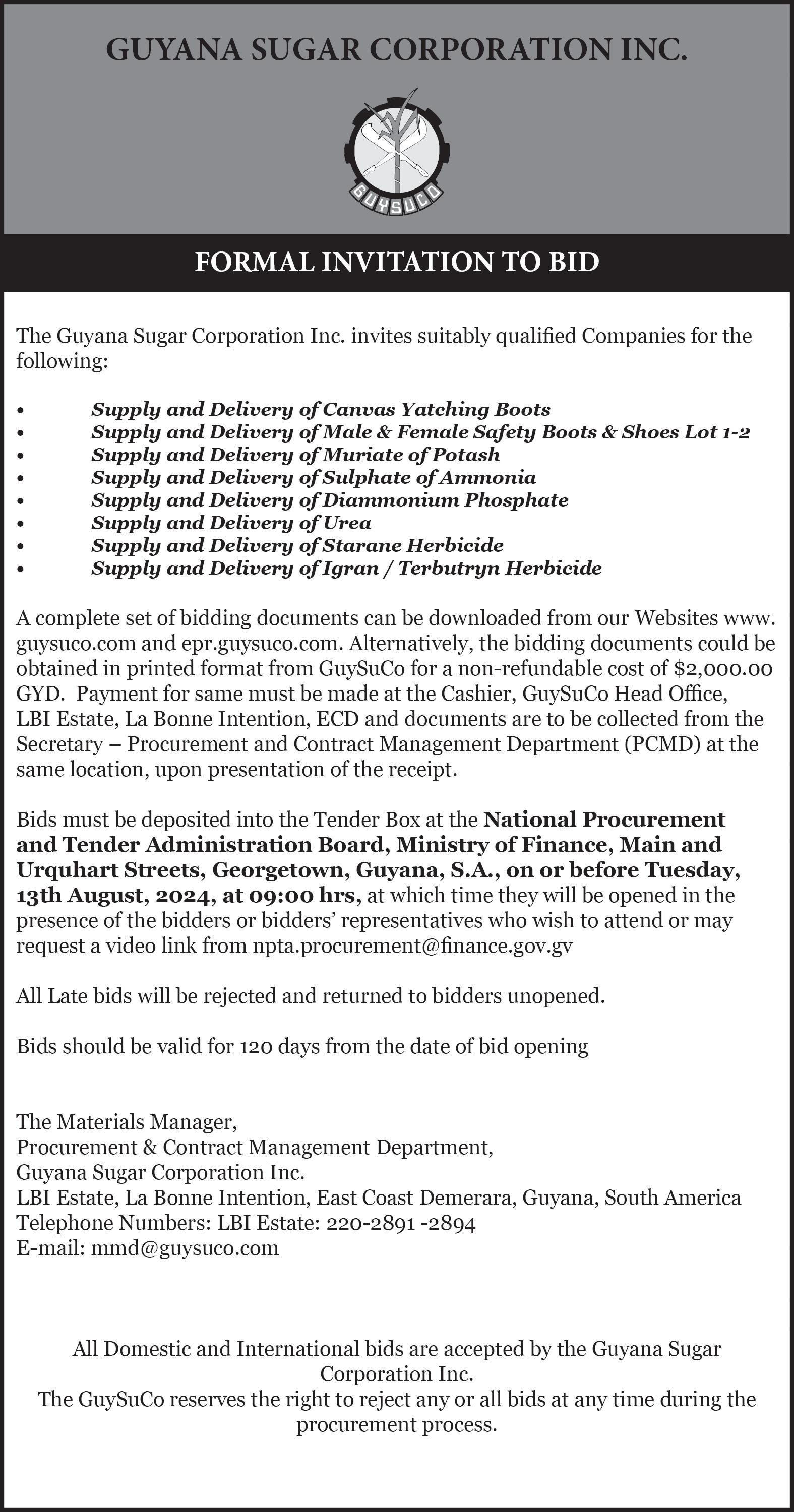
A hundred from West Indies Under-19 and ‘A’ Team batsman Jordan Johnson failed to inspire Jamaica, and Leeward Islands claimed a 19-run win, while Trinidad & Tobago defied a tidy allround performance from Kirt Murray, and clinched a one-wicket win against hosts Windward Islands in a nail-biting finish.
AT ARNOS VALE
Sealy, a member of the West Indies Under-19 team at the last ICC Men’s Under-19 World Cup in South Africa, was the pick of the Barbadian bowlers taking three for six from seven overs, and the Guyanese were dismissed for 58 in 33.4 overs after they were put in to bat.
King supported with three for seven from 6.4 overs, and leg-spinner Motara, a member of the Combined Campuses & Colleges Marooners during the last senior West Indies Championship, bagged three for 13 from his allotted 10 overs.
No Guyanese batsman reached 20, but opener
Rampertab Ramnauth led the way with 15, and their captain Mavendra Dindyal got 11.
Opener Zion Brathwaite then hit 28 not-out, and Joshua Morris was not-out on 23, and Barbados required only 47 balls to complete the run chase, and remain unbeaten after four consecutive wins, while Guyana slid to their first defeat.
AT PARK HILL
Johnson cracked 12 fours and six sixes in a dominant 106 off 83 balls, but no other Jamaican batsman reached 20.
The left-hander dominated stands of 72 with Kev’Aundre Virgo for the second wicket and 80 with Steve Wedderburn for the third wicket, but none of the other Jamaica batsmen fired, and the Leewards bowlers, led by Is-rael Morton, defied Johnson to help clinch the win.
Earlier, opener Michael Palmer hit the top score of 74 from 87 balls and West Indies Under-19 wicketkeeper-batsman
Jewel Andrew cracked 54 from 65 balls, and Leewards finished on 208 for nine from their 50 overs after they decided to bat.
A resolute 40 not-out from Fareez Ali enabled T&T to reach their target of 97 in a low-scoring contest against the Windwards.
Lee John and Murray grabbed three wickets apiece, and T&T stumbled to 62 for eight in the 22nd over, but Ali held his nerve and ushered the two-island republic youth over the finish line with two small partnerships with tail-enders Kevin Kanhai and Aneal Rooplal.
Earlier, Murray led the way with 29, but Windwards were bowled out for 96 in 35.5 overs after they decided to bat.
The tournament continues tomorrow when Guyana meet Windwards at Park Hill, Jamaica face T&T at Arnos Vale, and Leewards play Barbados at Cumberland.

A DOUBLE from Teon Stewart on Saturday evening ensured Ann's Grove United picked up an upset win against Fruta Conquerors in Season 6 of the KFC elite league at the Guyana Football Federation (GFF) National Training Centre.
Stewart firstly hit the back of the net in the 62nd minute before following up in the 82nd to put his team on course for a comfortable 2-1 win.
Conquerors caused some jitters when Dwayne Baptsite pulled back the narrow lead in the 85th minute.
Ann’s Grove, however, managed to survive the remaining five minutes of regular time, and the injury time that followed, to secure their fourth win in 17 outings this season.
The East Coast side is
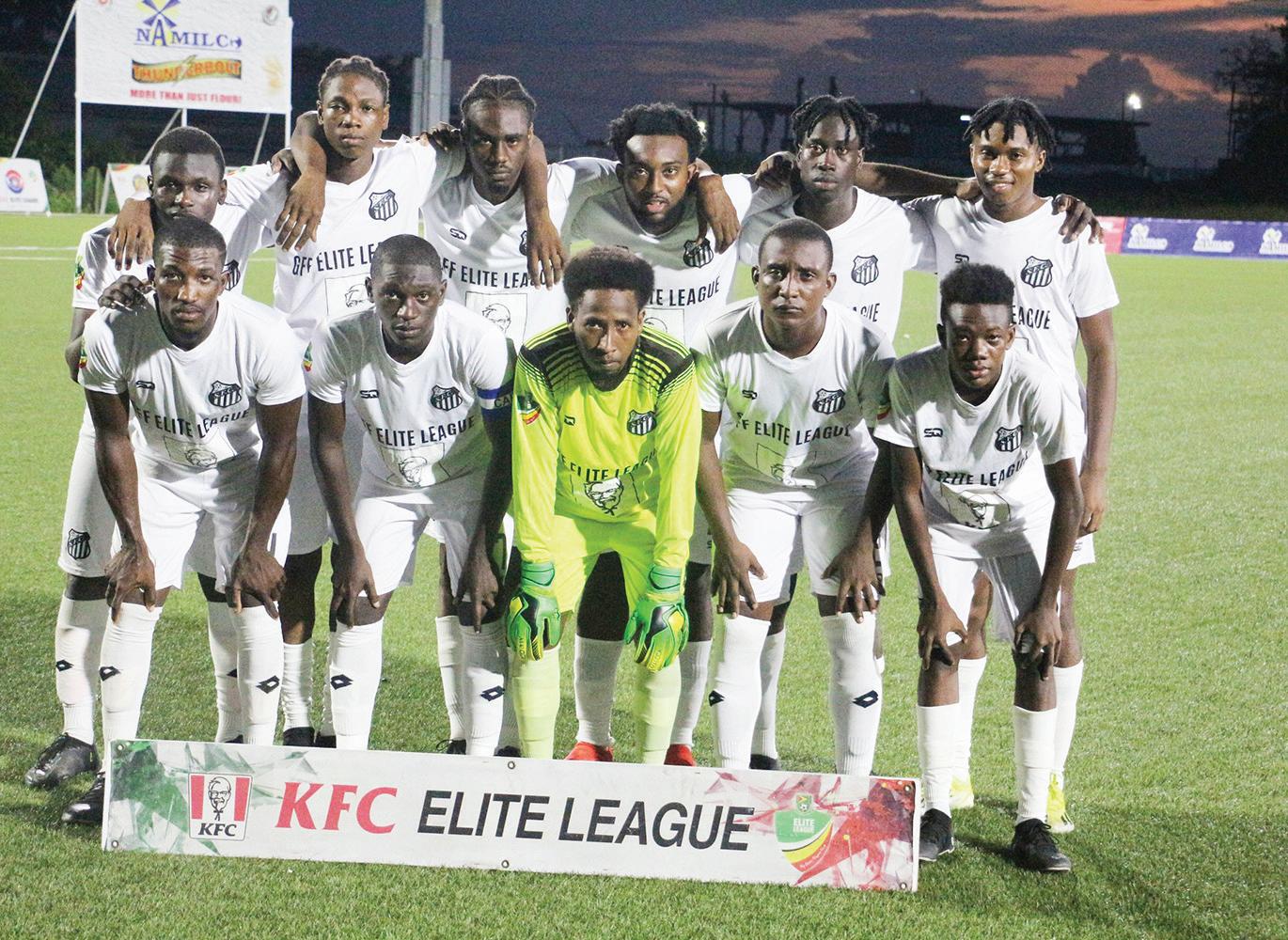
9th in the 10-team table, and currently in the relegation zone.
Fruta, for their part, suffered nine losses in 15 matches, with five wins and a draw.
Meanwhile, Santos got a boost in the standings,
as they leapfrogged Western Tigers with their 9th victory of the season, a 7-nil thrashing of Buxton United.
Stefan Reynolds was raring to go from the opening whistle, and quickly converted Santos' first goal

in the 2nd minute of play.
Bevney McGarrell doubled the advantage before the half-time break, as Santos looked in good touch.
The second half saw more intent from Santos, as McGarrell came back to register a brace, and give
them a 3-nil lead in the 65th minute.
In the 71st minute, Solomon Austin made it 4-nil, followed by McGarrell in the 82nd completing his hat-trick.
Austin made it a pair of goals for himself there-
after, with Shaquan Joseph guiding the ball into the net in injury time to finish off the sensational performance from Santos, 7-nil.
The win moves them to fourth in the table, with 9 wins in 15 matches with 6 losses.
Undefeated champions Guyana Defence Force still leads the standings with 13 wins and a draw in 14 games this season.
Next on the table is Slingerz, with 12 wins and 3 draws in 15 outings, followed closely by Guyana Police Force with 10 wins in 14 clashes with 3 losses and a draw.
The action continues on Thursday with Ann’s Grove meeting Police, and Den Amstel playing Western Tigers. Games begin at 18.30hrs at the NTC at Providence.
By Sean Devers
AFTER an almost three-hour late start due to the late arrival of the Berbice Gyms, the contest between Lennox Lawrence and Curtis McDonald produced the most entertaining fight of the 12 bouts carded for Saturday, when the GBA held its Schoolboys & Girls U-16 Boxing C/ships at the Andrew ‘Six Heads’ Boxing Gym in Albouystown.
In the penultimate tournament before the Guyana Team is selected for the Caribbean Schoolboys and girls U-16 Championships to be held here from August 16-18, Lawrence and McDonald went at each other in an action-packed fight.
McDonald caught Lawrence with a few clinical body shots, followed by left-right combinations to the head resulting in Lawrence being given a couple of standing eight-counts as McDonald dominated the opening round.
In the second round, Law-

rence demonstrated plenty of intestinal fortitude, and caught his man with some brutal uppercuts, which were set up by crisp jabs. McDonald counter-punched before Lawrence hit him with some good shots to the body and head, and it was McDonald who was staggered and given an eight-count to arguably take the second round.
The last round was shot-
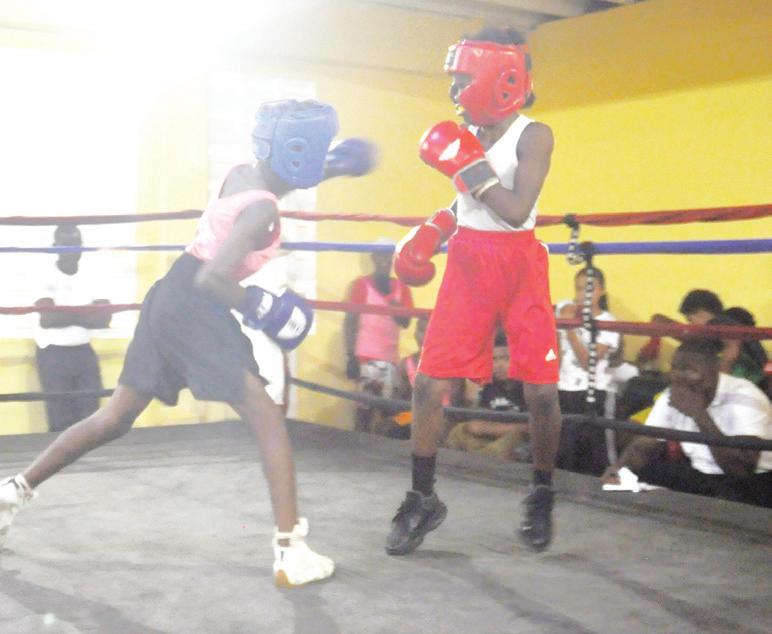
filled as the pugilists traded punches for the good-size gathering.
The pair continued to go toe-to-toe, firing away at each other, but when the dust settled, it was McDonald who had done enough to earn the split decision.
In the lone female match-up, Kenisha Klass from the Pace and Power Gym was all over her Corentyne Berbice opponent
Destiney Humphrey like a rash, and was in total control throughout the one-sided bout.
Another good fight was the second one of the day between Isiah Asby and Deshawn Willerby in the 35-28kg division, as the little warriors threw punches left, right and centre.
Teaka Narine and Travis Crooks engaged each other in the first Exhibition fight, while
the second Exhibition match was between Richard Spencer and Addle Peters.
However, the last Exhibition match and the last bout of the tournament was nothing like an Exhibition contest.
Jay Ramnarine and Shane Caesar went at each other with all that they had got with big booming shots, and even in the third and final round, both fighters, especially Ramnarine, kept getting hit with a flurry of hard shots.
Ramnarine was saved by the bell in the last round, since, seconds after the bell had been rung, he collapsed to the canvas and remained motionless for a short time; something rarely seen in Exhibition fights.
Meanwhile, GBA’s Technical Director Terrence Poole disclosed that 10 tournaments have been used so far to select the team for the Caribbean U-16 Championships.
“We will hold one more tournament on Saturday, August 3, at the Andrew Lewis boxing
gym from 13:00hrs before selecting a team for the Caribbean tournament, which starts on August 16,” Poole said.
The Guyana and GDF Boxing Coach said he was satisfied with the standard shown in Saturday’s tournament, adding, “But there is still some more work to be done, and most of the coaches would try to work on the technical aspect of the sport.”
This tournament was first held in 2017 in Guyana, and is the brainchild of GBA President Steve Ninvalle, who is also Guyana's Director of Sports.
OTHER RESULTS
Juniors: Akeem Quinton beat Kevin Class, Isiah Nurse stopped Andrew Rogers in the second round, Ken Harvey stopped Deshawn Ifill in the second round, Simon Haymer beat Julius Ceaser by TKO,